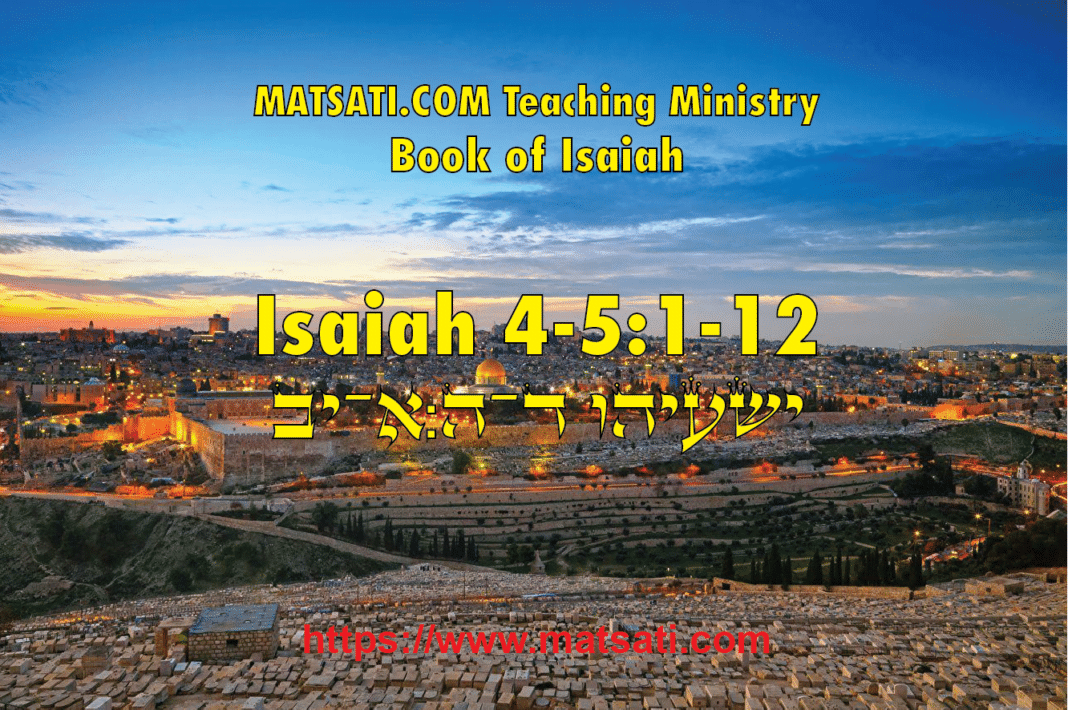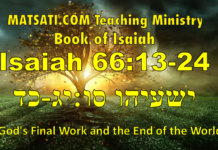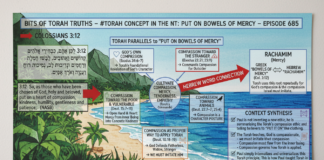Table of Contents
Introduction to Isaiah 4:1-6
Isaiah draws to a conclusion his comments concerning the pride of Israel. We note that Isaiah began in chapter 2 declaring how in the last days Zion, God’s holy mountain would be the chief of mountains, God’s Torah (His instruction) would go forth to the nations, and the nations would flow to Him (see Isaiah 2:1-5). Notice how Isaiah opens with Israel instructing the nations, but the reality is that God’s holy people, His holy city (Jerusalem) and Judah were in fact being taught by the nations to be unfaithful to God, and to trust in themselves as opposed to trusting in God. Isaiah went to great lengths to describe Jerusalem and Judah’s pride, going as far as comparing them to prideful women who make men lust for them. Even in the midst of their problems the Lord is still seeking Jerusalem and Judah’s repentance and turning from their sins. Isaiah continues to describe the state of Judah and Jerusalem saying the following.
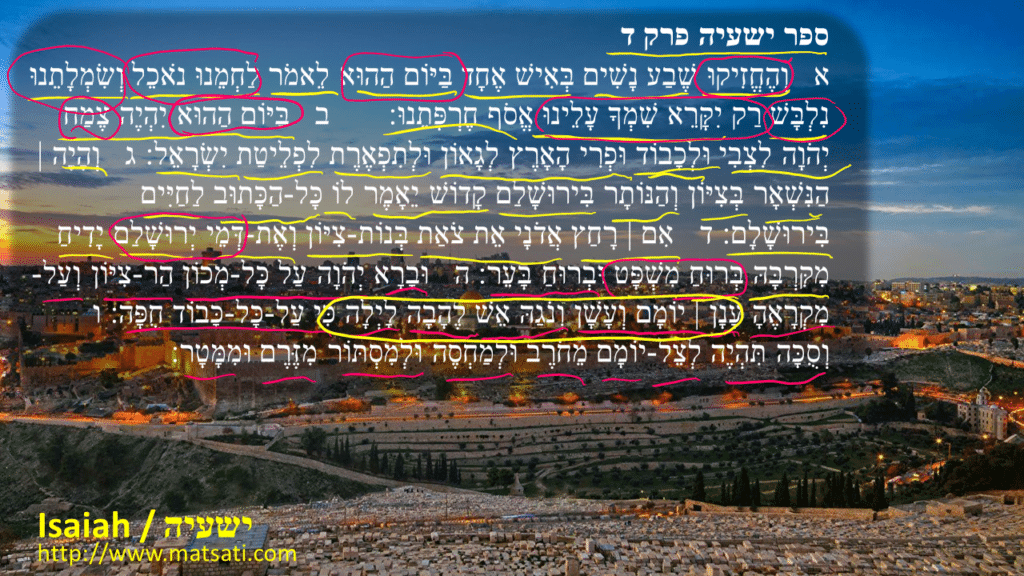
ספר ישעיה פרק ד
א וְהֶחֱזִיקוּ שֶׁבַע נָשִׁים בְּאִישׁ אֶחָד בַּיּוֹם הַהוּא לֵאמֹר לַחְמֵנוּ נֹאכֵל וְשִֹמְלָתֵנוּ נִלְבָּשׁ רַק יִקָּרֵא שִׁמְךָ עָלֵינוּ אֱסֹף חֶרְפָּתֵנוּ:
Isaiah 4:1 states, “And in that day seven women shall take hold of one man, saying, (וְהֶחֱזִיקוּ שֶׁבַע נָשִׁים בְּאִישׁ אֶחָד בַּיּוֹם הַהוּא לֵאמֹר) We will eat our own bread, (לַחְמֵנוּ נֹאכֵל) and wear our own apparel: (וְשִֹמְלָתֵנוּ נִלְבָּשׁ) only let us be called by thy name, to take away our reproach.(רַק יִקָּרֵא שִׁמְךָ עָלֵינוּ אֱסֹף חֶרְפָּתֵנוּ)” According to this verse, a woman’s shame is not being with a man taking on the name of their husband calling the lack of this as being a reproach. We note that when a nation is at war, there is the loss of men, as men are the ones who go to war against foreign nations. For example, American losses in World War I were modest compared to those of other belligerents, with 116,516 deaths and approximately 320,000 sick and wounded of the 4.7 million men who served. The USA lost more personnel to disease (63,114) than to combat (53,402), largely due to the influenza epidemic of 1918. Studying World War 1, notice out of 13 allied countries, over 5 million men lost their lives. There was a total of 42.6 million men who were mobilized for war, which gives 12.2% loss of the male population. That is significant. We note what Isaiah says, וְהֶחֱזִיקוּ שֶׁבַע נָשִׁים בְּאִישׁ אֶחָד בַּיּוֹם הַהוּא “And in that day seven women shall take hold of one man,” suggests that the devastation of the loss of men will be seven men to one woman. The women are forced to cease their flirtatious behavior walking around as Isaiah describes it saying in Isaiah 3:17, “Therefore the LORD will smite with a scab the crown of the head of the daughters of Zion, (וְשִֹפַּח אֲדֹנָי קָדְקֹד בְּנוֹת צִיּוֹן) and the LORD will discover their secret parts. (וַיהֹוָה פָּתְהֵן יְעָרֶה)” Isaiah 3:18 “In that day the Lord will take away (בַּיּוֹם הַהוּא יָסִיר אֲדֹנָי) the bravery of their tinkling ornaments about their feet, and their cauls, and their round tires like the moon, (אֵת תִּפְאֶרֶת הָעֲכָסִים וְהַשְּׁבִיסִים וְהַשַּׂהֲרֹנִים)” Isaiah 3:19 “The chains, (הַנְּטִיפוֹת) and the bracelets, (וְהַשֵּׁירוֹת) and the mufflers, (וְהָרְעָלוֹת)” Isaiah 3:20 “The bonnets, (הַפְּאֵרִים) and the ornaments of the legs, (וְהַצְּעָדוֹת) and the headbands, (וְהַקִּשֻּׁרִים) and the tablets, (הַנֶּפֶשׁ) and the earrings, (וְהַלְּחָשִׁים)” Isaiah 3:21 “The rings, (הַטַּבָּעוֹת) and nose jewels, (וְנִזְמֵי הָאָף)” Isaiah 3:22 “The changeable suits of apparel, (הַמַּחֲלָצוֹת) and the mantles, (וְהַמַּעֲטָפוֹת) and the wimples, (וְהַמִּטְפָּחוֹת) and the crisping pins, (וְהָחֲרִיטִים)” Isaiah 3:23 “The glasses, (וְהַגִּלְיֹנִים) and the fine linen, (וְהַסְּדִינִים) and the hoods, (וְהַצְּנִיפוֹת) and the vails. (וְהָרְדִידִים)” According to Isaiah 3:18, בַּיּוֹם הַהוּא יָסִיר אֲדֹנָי meaning “In that day the Lord will take away,” this describes God taking these things away. The Lord is not working in the heart of these women, but literally is removing that which they are desiring, the men are gone so that the women say, “We will eat our own bread, (לַחְמֵנוּ נֹאכֵל) and wear our own apparel: (וְשִֹמְלָתֵנוּ נִלְבָּשׁ) only let us be called by thy name, to take away our reproach.(רַק יִקָּרֵא שִׁמְךָ עָלֵינוּ אֱסֹף חֶרְפָּתֵנוּ)” The devastation of the male population is so great that their dependence isn’t upon the material but upon just being called by their name. We note that today the feminist movement seeks to be dominant and overpowering of men. The misguided aspect of this approach to life follows from what we have been studying here, that this is the desire to be self-sufficient, to not rely and trust in God, but to take pride to the point of denigrating men with an attitude of disposition despising men. In the drive to be self-sufficient, Isaiah warns these attitudes or ways of life bring humiliation, despair, and bondage, as this sets itself up against the joy of submitting to God and to one another with a servant attitude.
ספר ישעיה פרק ד
ב בַּיּוֹם הַהוּא יִהְיֶה צֶמַח יְהֹוָה לִצְבִי וּלְכָבוֹד וּפְרִי הָאָרֶץ לְגָאוֹן וּלְתִפְאֶרֶת לִפְלֵיטַת יִשְֹרָאֵל:
Isaiah 4:2 states, “In that day shall the branch of the LORD be beautiful and glorious, (בַּיּוֹם הַהוּא יִהְיֶה צֶמַח יְהֹוָה לִצְבִי וּלְכָבוֹד) and the fruit of the earth shall be excellent and comely (וּפְרִי הָאָרֶץ לְגָאוֹן וּלְתִפְאֶרֶת) for them that are escaped of Israel. (לִפְלֵיטַת יִשְֹרָאֵל)” Notice how the opening phrase, בַּיּוֹם הַהוּא “in that day, he” connects Isaiah 4 back to Isaiah 2:12, 2:17, 3:7, 3:18, and 4:1.
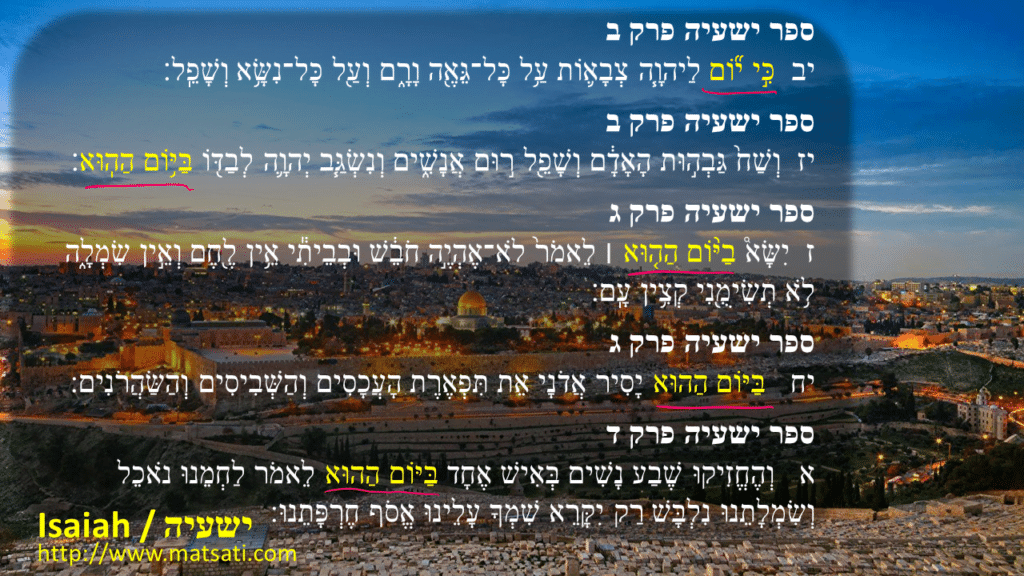
ספר ישעיה פרק ב
יב כִּ֣י י֞וֹם לַיהוָ֧ה צְבָא֛וֹת עַ֥ל כָּל־גֵּאֶ֖ה וָרָ֑ם וְעַ֖ל כָּל־נִשָּׂ֥א וְשָׁפֵֽל׃
ספר ישעיה פרק ב
יז וְשַׁח֙ גַּבְה֣וּת הָאָדָ֔ם וְשָׁפֵ֖ל ר֣וּם אֲנָשִׁ֑ים וְנִשְׂגַּ֧ב יְהוָ֛ה לְבַדּ֖וֹ בַּיּ֥וֹם הַהֽוּא׃
ספר ישעיה פרק ג
ז יִשָּׂא֩ בַיּ֨וֹם הַה֤וּא ׀ לֵאמֹר֙ לֹא־אֶהְיֶ֣ה חֹבֵ֔שׁ וּבְבֵיתִ֕י אֵ֥ין לֶ֖חֶם וְאֵ֣ין שִׂמְלָ֑ה לֹ֥א תְשִׂימֻ֖נִי קְצִ֥ין עָֽם׃
ספר ישעיה פרק ג
יח בַּיּוֹם הַהוּא יָסִיר אֲדֹנָי אֵת תִּפְאֶרֶת הָעֲכָסִים וְהַשְּׁבִיסִים וְהַשַּׂהֲרֹנִים:
ספר ישעיה פרק ד
א וְהֶחֱזִיקוּ שֶׁבַע נָשִׁים בְּאִישׁ אֶחָד בַּיּוֹם הַהוּא לֵאמֹר לַחְמֵנוּ נֹאכֵל וְשִֹמְלָתֵנוּ נִלְבָּשׁ רַק יִקָּרֵא שִׁמְךָ עָלֵינוּ אֱסֹף חֶרְפָּתֵנוּ:
Note how these different locations in the text from Isaiah 2, 3, and 4 contrast the hope that we have in God, that these judgements of God will not validate (or restore) the people due to their sins, and He will also not utterly wipe them out. The Lord is merciful seeking all to come to repentance. The day of the Lord brings with it God’s power to overcome the world, to cleansing, and restoration. Isaiah 4:2 seems to almost completely switch gears. What exactly is the branch of the Lord mentioned here in Isaiah 4:2? Glancing at the Targum Jonathan on Isaiah 4:2, we read בְעִידָנָא הַהוּא יְהֵי מְשִיחָא דַיוי לְחַדוָא וְלִיקָר וְעָבְדֵי אֹורָיתָא לִרבוּ וּלתוּשבְחָא לְשֵיזָבַת יִשׂרָאֵל׃ “At that time shall the Messiah of the Lord be for joy and for glory to those that are escaped, and those that keep the law shall be for greatness and for praise.” (TgJ) According to TgJ the branch is a reference to the Messiah of God! This draws in the same thought what we read according to Isaiah 11:1, וְיָצָ֥א חֹ֖טֶר מִגֵּ֣זַע יִשָׁ֑י וְנֵ֖צֶר מִשָּׁרָשָׁ֥יו יִפְרֶֽה׃ “And there shall come forth a rod out of the stem of Jesse, And a Branch shall grow out of his roots” which is also a messianic prophecy of the promised Messiah connecting back to King David. This particular word צֶמַח (branch) is found elsewhere in Scripture and interestingly enough these references contain a messianic expectation.
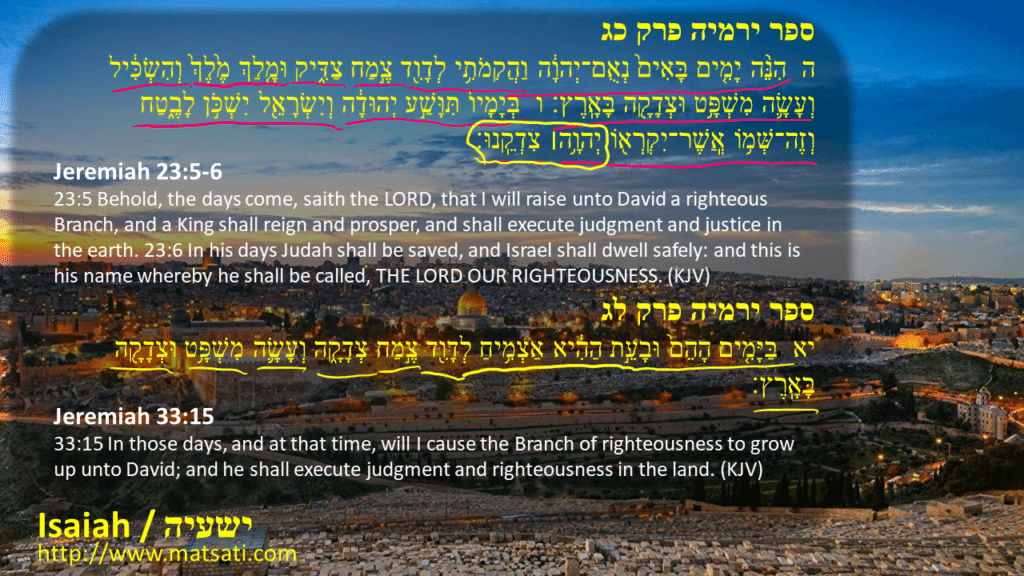
ספר ירמיה פרק כג
ה הִנֵּ֨ה יָמִ֤ים בָּאִים֙ נְאֻם־יְהוָ֔ה וַהֲקִמֹתִ֥י לְדָוִ֖ד צֶ֣מַח צַדִּ֑יק וּמָ֤לַךְ מֶ֙לֶךְ֙ וְהִשְׂכִּ֔יל וְעָשָׂ֛ה מִשְׁפָּ֥ט וּצְדָקָ֖ה בָּאָֽרֶץ׃ ו בְּיָמָיו֙ תִּוָּשַׁ֣ע יְהוּדָ֔ה וְיִשְׂרָאֵ֖ל יִשְׁכֹּ֣ן לָבֶ֑טַח וְזֶה־שְּׁמ֥וֹ אֲֽשֶׁר־יִקְרְא֖וֹ יְהוָ֥ה׀ צִדְקֵֽנוּ׃
Jeremiah 23:5-6
23:5 Behold, the days come, saith the LORD, that I will raise unto David a righteous Branch, and a King shall reign and prosper, and shall execute judgment and justice in the earth. 23:6 In his days Judah shall be saved, and Israel shall dwell safely: and this is his name whereby he shall be called, THE LORD OUR RIGHTEOUSNESS. (KJV)
ספר ירמיה פרק לג
יא בַּיָּמִ֤ים הָהֵם֙ וּבָעֵ֣ת הַהִ֔יא אַצְמִ֥יחַ לְדָוִ֖ד צֶ֣מַח צְדָקָ֑ה וְעָשָׂ֛ה מִשְׁפָּ֥ט וּצְדָקָ֖ה בָּאָֽרֶץ׃
Jeremiah 33:15
33:15 In those days, and at that time, will I cause the Branch of righteousness to grow up unto David; and he shall execute judgment and righteousness in the land. (KJV)
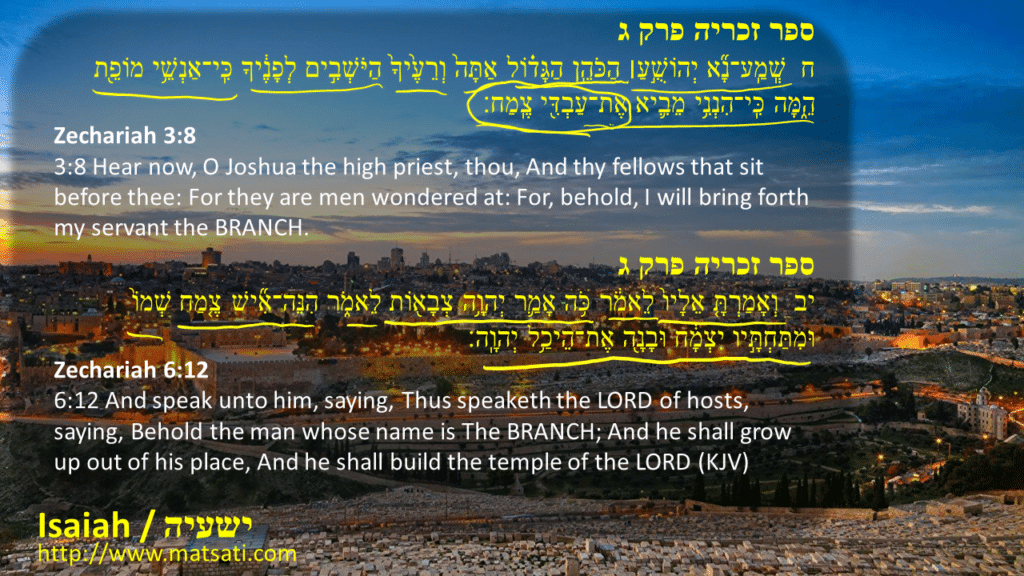
ספר זכריה פרק ג
ח שְֽׁמַֽע־נָ֞א יְהוֹשֻׁ֣עַ׀ הַכֹּהֵ֣ן הַגָּד֗וֹל אַתָּה֙ וְרֵעֶ֙יךָ֙ הַיֹּשְׁבִ֣ים לְפָנֶ֔יךָ כִּֽי־אַנְשֵׁ֥י מוֹפֵ֖ת הֵ֑מָּה כִּֽי־הִנְנִ֥י מֵבִ֛יא אֶת־עַבְדִּ֖י צֶֽמַח׃
Zechariah 3:8
3:8 Hear now, O Joshua the high priest, thou, And thy fellows that sit before thee: For they are men wondered at: For, behold, I will bring forth my servant the BRANCH.
ספר זכריה פרק ג
יב וְאָמַרְתָּ֤ אֵלָיו֙ לֵאמֹ֔ר כֹּ֥ה אָמַ֛ר יְהוָ֥ה צְבָא֖וֹת לֵאמֹ֑ר הִנֵּה־אִ֞ישׁ צֶ֤מַח שְׁמוֹ֙ וּמִתַּחְתָּ֣יו יִצְמָ֔ח וּבָנָ֖ה אֶת־הֵיכַ֥ל יְהוָֽה׃
Zechariah 6:12
6:12 And speak unto him, saying, Thus speaketh the LORD of hosts, saying, Behold the man whose name is The BRANCH; And he shall grow up out of his place, And he shall build the temple of the LORD (KJV)
These scriptures coupled with Isaiah 4:2 suggest that this 4:2 is the first reference to a savior Messiah. The text states, צֶמַח יְהֹוָה “branch of HaShem” which begs the interpretation of God providing the growth, which is synonymous to a tree that bears fruit for men to eat. It should be noted that the branch (צֶ֣מַח) is being spoken of following a picture of desolation. TgJ reveals the messianic nature of the text, and speaks of the restoration of the nation (Isaiah 4:3-4). Isaiah continues saying the following:
ספר ישעיה פרק ד
ג וְהָיָה | הַנִּשְׁאָר בְּצִיּוֹן וְהַנּוֹתָר בִּירוּשָׁלַם קָדוֹשׁ יֵאָמֶר לוֹ כָּל-הַכָּתוּב לַחַיִּים בִּירוּשָׁלָם: ד אִם | רָחַץ אֲדֹנָי אֵת צֹאַת בְּנוֹת-צִיּוֹן וְאֶת-דְּמֵי יְרוּשָׁלַם יָדִיחַ מִקִּרְבָּהּ בְּרוּחַ מִשְׁפָּט וּבְרוּחַ בָּעֵר:
Isaiah 4:3 states, “And it shall come to pass, (וְהָיָה) that he that is left in Zion, (הַנִּשְׁאָר בְּצִיּוֹן) and he that remaineth in Jerusalem, (וְהַנּוֹתָר בִּירוּשָׁלַם) shall be called holy, (קָדוֹשׁ יֵאָמֶר לוֹ) even every one that is written among the living in Jerusalem: (כָּל-הַכָּתוּב לַחַיִּים בִּירוּשָׁלָם)” Isaiah 4:4 “When the Lord shall have washed away the filth of the daughters of Zion, (אִם | רָחַץ אֲדֹנָי אֵת צֹאַת בְּנוֹת-צִיּוֹן) and shall have purged the blood of Jerusalem from the midst thereof by the spirit of judgment, (וְאֶת-דְּמֵי יְרוּשָׁלַם יָדִיחַ מִקִּרְבָּהּ בְּרוּחַ מִשְׁפָּט) and by the spirit of burning. (וּבְרוּחַ בָּעֵר)” The prophet speaks of those who remain, those who are left in Jerusalem and have been shown mercy by their remaining in the land. Isaiah says the Lord will wash the צֹאַת (excrement) from the daughters of Zion (בְּנוֹת-צִיּוֹן) and this will be accomplished by בְּרוּחַ מִשְׁפָּט (a spirit of judgment), and a וּבְרוּחַ בָּעֵר (a burning spirit). This is reminiscent of David’s Tehillim / Psalm 39.
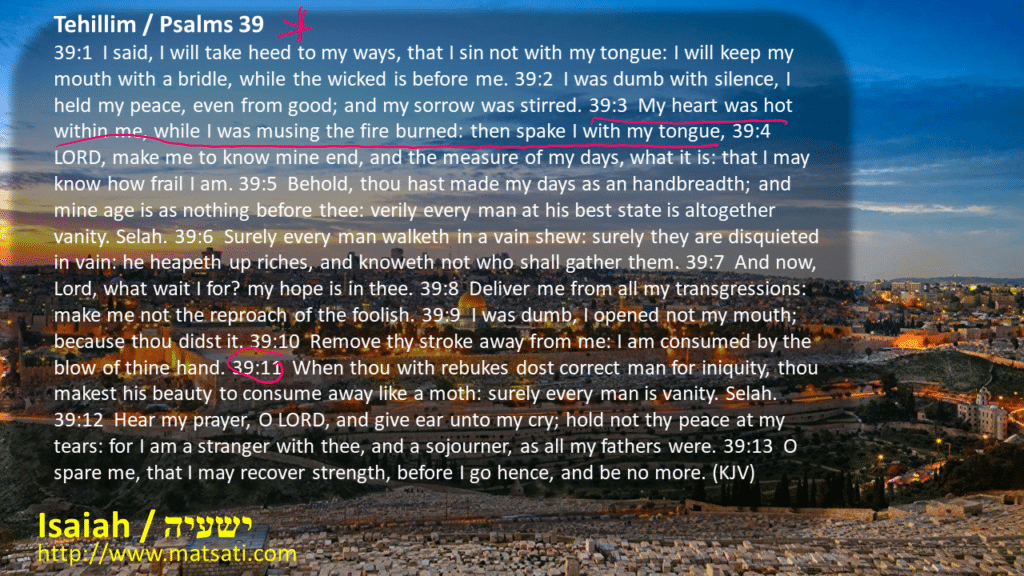
ספר תהילים פרק לט
א לַמְנַצֵּחַ לִידיּתוּן [לִידוּתוּן] מִזְמוֹר לְדָוִד: ב אָמַרְתִּי אֶשְׁמְרָה דְרָכַי מֵחֲטוֹא בִלְשׁוֹנִי אֶשְׁמְרָה לְפִי מַחְסוֹם בְּעֹד רָשָׁע לְנֶגְדִּי: ג נֶאֱלַמְתִּי דוּמִיָּה הֶחֱשֵׁיתִי מִטּוֹב וּכְאֵבִי נֶעְכָּר: ד חַם-לִבִּי | בְּקִרְבִּי בַּהֲגִיגִי תִבְעַר-אֵשׁ דִּבַּרְתִּי בִּלְשׁוֹנִי: ה הוֹדִיעֵנִי יְהֹוָה | קִצִּי וּמִדַּת יָמַי מַה-הִיא אֵדְעָה מֶה-חָדֵל אָנִי: ו הִנֵּה טְפָחוֹת | נָתַתָּה יָמַי וְחֶלְדִּי כְאַיִן נֶגְדֶּךָ אַךְ-כָּל-הֶבֶל כָּל-אָדָם נִצָּב סֶלָה: ז אַךְ-בְּצֶלֶם | יִתְהַלֶּךְ-אִישׁ אַךְ-הֶבֶל יֶהֱמָיוּן יִצְבֹּר וְלֹא-יֵדַע מִי-אֹסְפָם: ח וְעַתָּה מַה-קִּוִּיתִי אֲדֹנָי תּוֹחַלְתִּי לְךָ הִיא: ט מִכָּל-פְּשָׁעַי הַצִּילֵנִי חֶרְפַּת נָבָל אַל-תְּשִֹימֵנִי: י נֶאֱלַמְתִּי לֹא אֶפְתַּח-פִּי כִּי אַתָּה עָשִֹיתָ: יא הָסֵר מֵעָלַי נִגְעֶךָ מִתִּגְרַת יָדְךָ אֲנִי כָלִיתִי: יב בְּתוֹכָחוֹת עַל-עָוֹן | יִסַּרְתָּ אִישׁ וַתֶּמֶס כָּעָשׁ חֲמוּדוֹ אַךְ הֶבֶל כָּל-אָדָם סֶלָה: יג שִׁמְעָה-תְפִלָּתִי | יְהֹוָה וְשַׁוְעָתִי | הַאֲזִינָה אֶל-דִּמְעָתִי אַל-תֶּחֱרַשׁ כִּי גֵר אָנֹכִי עִמָּךְ תּוֹשָׁב כְּכָל-אֲבוֹתָי: יד הָשַׁע מִמֶּנִּי וְאַבְלִיגָה בְּטֶרֶם אֵלֵךְ וְאֵינֶנִּי:
Tehillim / Psalms 39
39:1 I said, I will take heed to my ways, that I sin not with my tongue: I will keep my mouth with a bridle, while the wicked is before me. 39:2 I was dumb with silence, I held my peace, even from good; and my sorrow was stirred. 39:3 My heart was hot within me, while I was musing the fire burned: then spake I with my tongue, 39:4 LORD, make me to know mine end, and the measure of my days, what it is: that I may know how frail I am. 39:5 Behold, thou hast made my days as an handbreadth; and mine age is as nothing before thee: verily every man at his best state is altogether vanity. Selah. 39:6 Surely every man walketh in a vain shew: surely they are disquieted in vain: he heapeth up riches, and knoweth not who shall gather them. 39:7 And now, Lord, what wait I for? my hope is in thee. 39:8 Deliver me from all my transgressions: make me not the reproach of the foolish. 39:9 I was dumb, I opened not my mouth; because thou didst it. 39:10 Remove thy stroke away from me: I am consumed by the blow of thine hand. 39:11 When thou with rebukes dost correct man for iniquity, thou makest his beauty to consume away like a moth: surely every man is vanity. Selah. 39:12 Hear my prayer, O LORD, and give ear unto my cry; hold not thy peace at my tears: for I am a stranger with thee, and a sojourner, as all my fathers were. 39:13 O spare me, that I may recover strength, before I go hence, and be no more. (KJV)
David speaks saying ד חַם-לִבִּי | בְּקִרְבִּי בַּהֲגִיגִי תִבְעַר-אֵשׁ דִּבַּרְתִּי בִּלְשׁוֹנִי 39:3 My heart was hot within me, while I was musing the fire burned: then spake I with my tongue. (KJV) He goes on to speak of his transgressions, and of the end of his days. Our lives are but a breath, and every man walks in vain. יב בְּתוֹכָחוֹת עַל-עָוֹן | יִסַּרְתָּ אִישׁ וַתֶּמֶס כָּעָשׁ חֲמוּדוֹ אַךְ הֶבֶל כָּל-אָדָם סֶלָה 39:11 When thou with rebukes dost correct man for iniquity, thou makest his beauty to consume away like a moth: surely every man is vanity. Selah. (KJV) This is reminiscent of what Isaiah is speaking of concerning these daughters of zion (בְּנוֹת-צִיּוֹן). This is the purpose of judgement, followed by God’s redemption, which is illustrative of our being created in His image, we are being told how we are to be like God walking in His holy ways. This was the purpose of God giving us His Torah, so as to be holy as He is holy. (see Vayikra / Leviticus 19:2 and 22:31-33) We are God’s inheritance, we belong to Him, and we are sanctified by His presence, and so He calls us to sanctify our lives by living for Him. Remember, the Torah was not given so that man could earn his salvation or earn his own form of righteousness and holiness before God! The point of Torah was so we would know what the Lord expects of us as a result of our already being in a covenant relationship, which is synonymous to our being saved. Remember how according to Vayikra / Leviticus 10, that the objects of the Tabernacle were not for common use? This is how our lives are to be, we are not to live in such a way as to join ourselves with the nations, like what we see going on here through Isaiah, the people were being taught by the nations. We are to be taught by God for the purpose of glorifying His name! By holiness we are called to reflect the character of God, to be a light to the nations, this comes by the ethical and moral aspects of the Mitzvot (commands) which are to be lived out in a person’s life to demonstrate how God has worked in our lives. Note also we must have circumcised hearts, something that only God can do, from a Torah perspective! This purging fire as David says burns from within. This is a gift from God, of giving us a desire to live for Him and not for ourselves and for the pleasures of this life. Some questions we have though, is whether this fire that is from within will purify from sin? From Judaism’s perspective, all one has to be is repentant, and to study the Torah, it is as if one has rebuilt the sacrificial system. Would the imagination of the heart to rebuild the Temple in Jerusalem be sufficient to atone for sin? Sin must be confessed (see Vayikra / Leviticus 1:4, 16:20–22, and Isaiah 53:4-5), and it cannot be atoned apart from bloodshed (see Vayikra / Leviticus 16:11–19, 17:11, Isaiah 53:12, and Matthew 26:28). We note from the Messianic perspective, the NT looks to the Messiah, the Anointed one of God, as making atonement for the people.
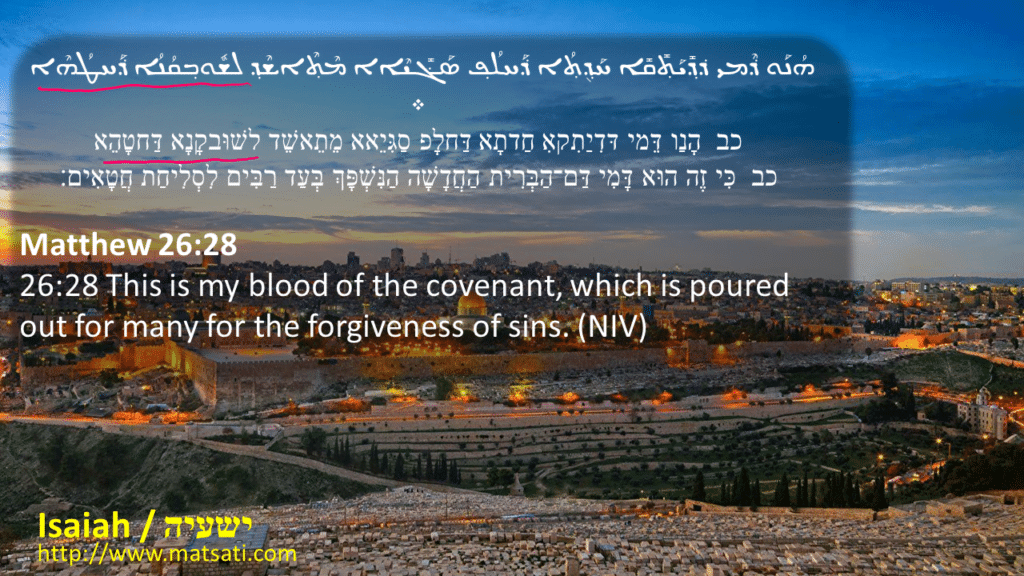
ܗܳܢܰܘ ܕ݁ܶܡܝ ܕ݁ܕ݂ܺܝܰܬ݂ܺܩܺܐ ܚܰܕ݂݈ܬ݂ܳܐ ܕ݁ܰܚܠܳܦ݂ ܣܰܓ݁ܺܝܶܐܐ ܡܶܬ݂ܶܐܫܶܕ݂ ܠܫܽܘܒ݂ܩܳܢܳܐ ܕ݁ܰܚܛܳܗܶܐ ܀
כב הָנַו דֵּמי דּדִיַתִקאִ חַדתָא דַּחלָפ סַגִּיֵאא מֵתֵאשֵׁד לשׁוּבקָנָא דַּחטָהֵא
כב כִּי זֶה הוּא דָּמִי דַּם־הַבְּרִית הַחֲדָשָׁה הַנִּשְׁפָּךְ בְּעַד רַבִּים לִסְלִיחַת חֲטָאִים׃
Matthew 26:28
26:28 This is my blood of the covenant, which is poured out for many for the forgiveness of sins. (NIV)
The NT describes Yeshua saying that his blood represented by the Passover cup, will be poured out ܠܫܽܘܒ݂ܩܳܢܳܐ ܕ݁ܰܚܛܳܗܶܐ the לשׁוּבקָנָא דַּחטָהֵא or לִסְלִיחַת חֲטָאִים “for the forgiveness of sins.” We note that this is not effective unless one responds to the divine call of God to believe. Those who do not respond will not be saved. This is how Isaiah is responding according to Isaiah 4:5-6.
ספר ישעיה פרק ד
ה וּבָרָא יְהֹוָה עַל כָּל-מְכוֹן הַר-צִיּוֹן וְעַל-מִקְרָאֶהָ עָנָן | יוֹמָם וְעָשָׁן וְנֹגַהּ אֵשׁ לֶהָבָה לָיְלָה כִּי עַל-כָּל-כָּבוֹד חֻפָּה: ו וְסֻכָּה תִּהְיֶה לְצֵל-יוֹמָם מֵחֹרֶב וּלְמַחְסֶה וּלְמִסְתּוֹר מִזֶּרֶם וּמִמָּטָר:
Isaiah 4:5 states, “And the LORD will create upon every dwelling place of mount Zion, (וּבָרָא יְהֹוָה עַל כָּל-מְכוֹן הַר-צִיּוֹן) and upon her assemblies, (וְעַל-מִקְרָאֶהָ) a cloud and smoke by day, (עָנָן | יוֹמָם וְעָשָׁן) and the shining of a flaming fire by night: (וְנֹגַהּ אֵשׁ לֶהָבָה לָיְלָה) for upon all the glory shall be a defence. (כִּי עַל-כָּל-כָּבוֹד חֻפָּה)” Isaiah 4:6 “And there shall be a tabernacle for a shadow in the day time from the heat, (וְסֻכָּה תִּהְיֶה לְצֵל-יוֹמָם מֵחֹרֶב) and for a place of refuge, (וּלְמַחְסֶה) and for a covert from storm (וּלְמִסְתּוֹר מִזֶּרֶם) and from rain. (וּמִמָּטָר)” Note how Isaiah is called upon the imagery of the Torah speaking of “a cloud and smoke by day,” (עָנָן | יוֹמָם וְעָשָׁן) “and the shining of a flaming fire by night” (וְנֹגַהּ אֵשׁ לֶהָבָה לָיְלָה) and the idea of being shaded from the heat in 4:6 in the Tabernacle of God, these things speak again to the willingness of responding to the call of God. According to Zechariah 3:8-9, it is through the צֶמַח (branch) that the sins of Judah will be removed. Note how this is consistent with the NT interpretation and statements from Yeshua. The imagery of the Torah draws in a sense of continuity from the opening pages of the Scriptures until now. This suggests to us that the Lord God does not abandon his covenant made at Sinai as most theologies today declare. The Torah remains as a foundation stone for us who are in Yeshua the Messiah as a guide for moral and ethical living. We again note the Torah perspective is for God’s presence to dwell in our midst. (Shemot / Exodus 40:34-38) And how we literally receive the presence of God in our lives through faith in Yeshua. Here Isaiah describes the Shekhinah as covering the mountain of Zion and all of those who assemble there and today literally each person has the opportunity to receive the Presence of God into their lives. (Ezekiel 39:25-29, John 17:10, 17:22, 17:24) Those who abide in the shadow of God’s strength and presence have nothing to fear. (Romans 8:38, Ephesians 1:21,1: 22, 6:12) of this world.
Isaiah 5:1-12
Isaiah chapter 1 through 4 lay the groundwork for explaining the great sin of Judah and Jerusalem before God, and the reason for the events that follow (exile to Babylon). In the following verses, we are told about the vineyard (5:1-7) and then Isaiah goes on to describe six conditions of the people that are contrary to God’s righteous and holy ways. (5:8-27). Isaiah opens chapter 5 saying the following:
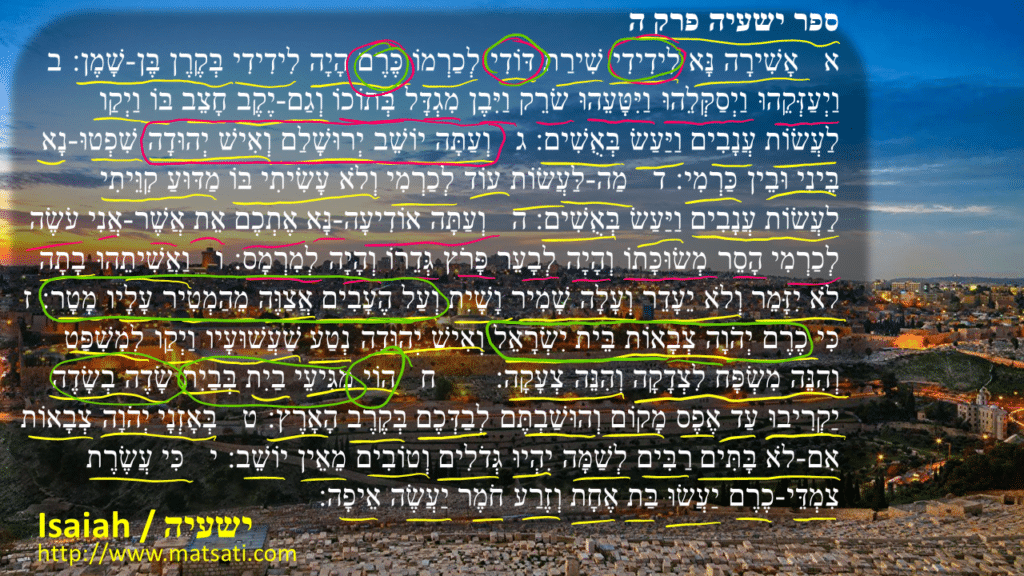
ספר ישעיה פרק ה
א אָשִׁירָה נָּא לִידִידִי שִׁירַת דּוֹדִי לְכַרְמוֹ כֶּרֶם הָיָה לִידִידִי בְּקֶרֶן בֶּן-שָׁמֶן:
Isaiah 5:1 states, “Now will I sing to my well beloved a song of my beloved touching his vineyard. (אָשִׁירָה נָּא לִידִידִי שִׁירַת דּוֹדִי לְכַרְמוֹ) My wellbeloved hath a vineyard (כֶּרֶם הָיָה לִידִידִי) in a very fruitful hill (בְּקֶרֶן בֶּן-שָׁמֶן)” The way this text is written reminds us of the book the Song of Solomon with this use of the words לִידִידִי ,דּוֹדִי, and לְכַרְמוֹ (beloved, and vineyard). The mention of a vineyard is reminiscent of the צֶמַח יְהֹוָה “branch of HaShem.” The last part of the verse, בְּקֶרֶן בֶּן-שָׁמֶן seems to translate as “horn/strength” (בְּקֶ֥רֶן) “son” (בֶּן) of “oil/fat” (שָׁמֶן). Ibn Ezra states this refers to a beautiful spot among the vineyards of Jerusalem. We note that if we consider these words, they may be an abstraction to the altar in the Mishkhan (Tabernacle) and the fat of the sacrifice and the oil. According to the Torah, the fat was regarded with as much sacredness as the blood (Vayikra / Leviticus 3:17 and 7:22-27). In the Apostolic Writings, “fat “ is not mentioned once, but “blood” continues to be mentioned. Fat represented perfection and good health in the sacrificial animal. The penalty for anyone eating the “fat” was to “be cut off from his/her people.” Vayikra / Leviticus 7:22-25 And the LORD spake unto Moses, saying, Speak unto the children of Israel, saying, Ye shall eat no manner of fat, of ox, or of sheep, or of goat. And the fat of the beast that dieth of itself, and the fat of that which is torn with beasts, may be used in any other use: but ye shall in no wise eat of it. For whosoever eateth the fat of the beast, of which men offer an offering made by fire unto the LORD, even the soul that eateth it shall be cut off from his people. (KJV) This is a key verse from the Torah to explain these things on the subject of the fat. What exactly does this explain to us? What we are being told is that the Lord God is very serious about not eating the fat, and this verse makes it clear that it is the visceral fat that is being referred to. In addition to this, notice that the fat is not tamei (unclean) like pork and other meats are described according to Parashat Kedoshim. The reason we know this is that the visceral fat may be used to manufacture soap, grease, candles, waterproofing, and quite a few other things which may be used by God’s people. Also, it is interesting to note that the Torah only mentions the fat of oxen, sheep, and goats; it does not mention chicken fat or fish fat. Chicken and fish are completely ignored. This is where the Torah based perspective becomes so valuable as the manner in which we are to understand the Scriptures. This world, and the things in it, are made after the pattern of heavenly things. The author of Hebrews 8:5 indicates this through the example of the Tabernacle, sacrifice, and atonement. We also know that we are fashioned in the pattern of God; made in his image. But the world around us is all a part of a master plan; from what the animals represent to how they are made, it is all part of the larger picture. And specifically when we read about those things, God makes an issue such as the fat and the blood being reserved for Him alone, for the altar, and for atonement, this reveals to us that there is a deeper symbolic meaning. Here the oil and the fat are coupled to the one as touching the vineyard of God, and the branch which is most likely in this vineyard is representative of the Messiah. The fat describes the good things of God and as touching the things of God, as Isaiah is saying, as touching the Messiah of God, walking in His footsteps, we receive the blessing from God Almighty in heaven and are doing what the Lord wants for our lives. Isaiah continues saying the following:
ספר ישעיה פרק ה
ב וַיְעַזְּקֵהוּ וַיְסַקְּלֵהוּ וַיִּטָּעֵהוּ שֹֹרֵק וַיִּבֶן מִגְדָּל בְּתוֹכוֹ וְגַם-יֶקֶב חָצֵב בּוֹ וַיְקַו לַעֲשֹוֹת עֲנָבִים וַיַּעַשֹ בְּאֻשִׁים:
Isaiah 5:2 states, “And he fenced it, and gathered out the stones thereof, and planted it with the choicest vine, and built a tower in the midst of it, (וַיְעַזְּקֵהוּ וַיְסַקְּלֵהוּ וַיִּטָּעֵהוּ שֹֹרֵק וַיִּבֶן מִגְדָּל בְּתוֹכוֹ) and also made a winepress therein: and he looked that it should bring forth grapes, and it brought forth wild grapes. (וְגַם-יֶקֶב חָצֵב בּוֹ וַיְקַו לַעֲשֹוֹת עֲנָבִים וַיַּעַשֹ בְּאֻשִׁים)” Here we read about the one who chooses to protect his vineyard by putting up a fence. We think that this is done so animals will not go into the vineyard and eat up all of the fruit. The owner וַיִּבֶן מִגְדָּל בְּתוֹכוֹ “builds a tower in its midst” for the purpose of security, to keep watch. We also note removing stones may result in enhanced weathering and improve the quality of the soil. This is what happens when a farmer puts limestone down on the land to increase crop yield. All of these things reveal to us the farmer’s commitment to his vineyard, to tend, to take care of, to protect, etc. These things are a parable of a sort to describe how God takes care of us, tending, watering, feeding, and causing us to grow. The end result of God’s tending and blessing, the people turned out like worthless grapes, even though great work went into the vineyard.
ספר ישעיה פרק ה
ג וְעַתָּה יוֹשֵׁב יְרוּשָׁלַם וְאִישׁ יְהוּדָה שִׁפְטוּ-נָא בֵּינִי וּבֵין כַּרְמִי: ד מַה-לַּעֲשֹוֹת עוֹד לְכַרְמִי וְלֹא עָשִֹיתִי בּוֹ מַדּוּעַ קִוֵּיתִי לַעֲשֹוֹת עֲנָבִים וַיַּעַשֹ בְּאֻשִׁים:
Isaiah 5:3 states, “And now, O inhabitants of Jerusalem, (וְעַתָּה יוֹשֵׁב יְרוּשָׁלַם) and men of Judah, (וְאִישׁ יְהוּדָה) judge, I pray you, betwixt me and my vineyard. (שִׁפְטוּ-נָא בֵּינִי וּבֵין כַּרְמִי)” Isaiah 5:4 “What could have been done more to my vineyard, (מַה-לַּעֲשֹוֹת עוֹד לְכַרְמִי) that I have not done in it? (וְלֹא עָשִֹיתִי בּוֹ) wherefore, when I looked that it should bring forth grapes, brought it forth wild grapes? (מַדּוּעַ קִוֵּיתִי לַעֲשֹוֹת עֲנָבִים וַיַּעַשֹ בְּאֻשִׁים)” Here Isaiah makes clear who the vineyard is referring to according to Isaiah 5:3, it appears to be the people of Israel as God speaks to the men of Judah saying, שִׁפְטוּ-נָא בֵּינִי וּבֵין כַּרְמִי “judge, now, between me and my vineyard.” This idea of wild grapes is a reference to untended grapes, or vines that have been unpruned. In order to get very large and fat grapes, one must prune back the vine so the vitality of the plant can go into the grapes. This is what appears to be happening in the parallel to Judah and Jerusalem, all that God had done for the people and yet their fruit is lacking. What could Judah and Jerusalem have done to produce more fruit? This is something that speaks to our hearts today, we are to limit our exposure to the sinful ways of the world, and spend more time in God’s Word, and in prayer! We note that the Lord God as the farmer has put in such hard work, but if the plants (people) are not being nourished by God’s holy Word, the ultimate outcome is something that falls greatly short of what the Lord wants or expects for our lives!
ספר ישעיה פרק ה
ה וְעַתָּה אוֹדִיעָה-נָּא אֶתְכֶם אֵת אֲשֶׁר-אֲנִי עֹשֶֹה לְכַרְמִי הָסֵר מְשֹוּכָּתוֹ וְהָיָה לְבָעֵר פָּרֹץ גְּדֵרוֹ וְהָיָה לְמִרְמָס: ו וַאֲשִׁיתֵהוּ בָתָה לֹא יִזָּמֵר וְלֹא יֵעָדֵר וְעָלָה שָׁמִיר וָשָׁיִת וְעַל הֶעָבִים אֲצַוֶּה מֵהַמְטִיר עָלָיו מָטָר:
Isaiah 5:5 states, “And now go to; I will tell you what I will do to my vineyard: (וְעַתָּה אוֹדִיעָה-נָּא אֶתְכֶם אֵת אֲשֶׁר-אֲנִי עֹשֶֹה לְכַרְמִי) I will take away the hedge thereof, and it shall be eaten up; and break down the wall thereof, and it shall be trodden down: (הָסֵר מְשֹוּכָּתוֹ וְהָיָה לְבָעֵר פָּרֹץ גְּדֵרוֹ וְהָיָה לְמִרְמָס)” Isaiah 5:6 “And I will lay it waste: (וַאֲשִׁיתֵהוּ בָתָה) it shall not be pruned, (לֹא יִזָּמֵר) nor digged; (וְלֹא יֵעָדֵר) but there shall come up briers and thorns: (וְעָלָה שָׁמִיר וָשָׁיִת) I will also command the clouds that they rain no rain upon it. (וְעַל הֶעָבִים אֲצַוֶּה מֵהַמְטִיר עָלָיו מָטָר)” The Lord describes the consequences of a vineyard that does not produce the intended fruit, He will tear down the wall and allow the wild animals to feed on it. All of the work that went into the vineyard, producing only grapes that appear to be wild and untended, the owner will consider the vineyard as a worthless plot of land. The statement וְעַל הֶעָבִים אֲצַוֶּה מֵהַמְטִיר עָלָיו מָטָר “and upon the clouds, I will also command that they rain no rain upon it.” This statement makes clear who the farmer is, for it is only God who is able to command the clouds to not produce rain.
ספר ישעיה פרק ה
ז כִּי כֶרֶם יְהֹוָה צְבָאוֹת בֵּית יִשְֹרָאֵל וְאִישׁ יְהוּדָה נְטַע שַׁעֲשׁוּעָיו וַיְקַו לְמִשְׁפָּט וְהִנֵּה מִשְֹפָּח לִצְדָקָה וְהִנֵּה צְעָקָה:
Isaiah 5:7 states, “For the vineyard of the LORD of hosts is the house of Israel, (כִּי כֶרֶם יְהֹוָה צְבָאוֹת בֵּית יִשְֹרָאֵל) and the men of Judah his pleasant plant: (וְאִישׁ יְהוּדָה נְטַע שַׁעֲשׁוּעָיו) and he looked for judgment, (וַיְקַו לְמִשְׁפָּט) but behold oppression; for righteousness, but behold a cry. (וְהִנֵּה מִשְֹפָּח לִצְדָקָה וְהִנֵּה צְעָקָה)” Note here Isaiah makes it clear without question, the vineyard of God is the house of Israel! (כִּי כֶרֶם יְהֹוָה צְבָאוֹת בֵּית יִשְֹרָאֵל) This brings us back to Isaiah 5:1, the way this text parallels the Song of Solomon with the use of the words לִידִידִי ,דּוֹדִי, and לְכַרְמוֹ (beloved, and vineyard), “Now will I sing to my well beloved a song of my beloved touching his vineyard. (אָשִׁירָה נָּא לִידִידִי שִׁירַת דּוֹדִי לְכַרְמוֹ) My wellbeloved hath a vineyard (כֶּרֶם הָיָה לִידִידִי) in a very fruitful hill (בְּקֶרֶן בֶּן-שָׁמֶן)” It is clear that Israel is the source of God’s delight, and it is the Lord God who is the one speaking here. God’s people are the fruit of His labor, and His people are to exhibit justice, righteousness, holiness, and truth, the things that He has worked for in their lives as opposed to violence, murders, oppression, injustice, and lies. We note that when we live unrepentant lives, this is analogous to cultivating sin in our lives. These things lead to a perversion of what God calls good.
ספר ישעיה פרק ה
ח הוֹי מַגִּיעֵי בַיִת בְּבַיִת שָֹדֶה בְשָֹדֶה יַקְרִיבוּ עַד אֶפֶס מָקוֹם וְהוּשַׁבְתֶּם לְבַדְּכֶם בְּקֶרֶב הָאָרֶץ:
Isaiah 5:8 states, “Woe unto them that join house to house, (הוֹי מַגִּיעֵי בַיִת בְּבַיִת) that lay field to field, till there be no place, (שָֹדֶה בְשָֹדֶה יַקְרִיבוּ עַד אֶפֶס מָקוֹם) that they may be placed alone in the midst of the earth! (וְהוּשַׁבְתֶּם לְבַדְּכֶם בְּקֶרֶב הָאָרֶץ)” As we read on in Isaiah 5, we read how Isaiah describes the people’s sin as including greed (5:8-10), debauchery (5:11-12), arrogance (5:18-19), perversion (5:20-21), and injustice (5:22-23). This list is introduced by this word הוֹי “woe.” Notice how Isaiah 5:8 describes the situation, הוֹי מַגִּיעֵי בַיִת בְּבַיִת שָֹדֶה בְשָֹדֶה יַקְרִיבוּ עַד אֶפֶס מָקוֹם וְהוּשַׁבְתֶּם לְבַדְּכֶם בְּקֶרֶב הָאָרֶץ “Woe unto them that join house to house, that lay field to field, till there be no place, that they may be placed alone in the midst of the earth!” This describes the removal of boundary stones and boundary lines for properties in Israel. What is the significance of this? This is how the people have learned the way of the nations, to become like them, so that there is no distinction between the sacred and the profane, between the clean and the unclean. This is where wanton behavior and the indulgence in pleasure leads to unrepentant sin. This reminds us of Yeshua’s words when he said, “What shall it profit a man if he gains the whole world and loses his own soul?” (Matthew 16:26). John Oswalt focuses upon the land as belonging to God and the people were not to parcel out the land as they wished but to keep it within the family / tribal ownership. When we take a Torah perspective, these things point us to the removal of the property markers as a way of describing the people mingling with the ways of the nations, and thus the conclusion is the people are no longer holy and separate unto God but are placed alone in the midst of the world. (וְהוּשַׁבְתֶּם לְבַדְּכֶם בְּקֶרֶב הָאָרֶץ) We can’t neglect the idea though that Isaiah 5:8 may be describing the wealthy being involved in “land grabbing” from the sense of wanting to gain ownership of all the land in Israel so as to keep the people in servitude. This is an interesting thought as we see what is going on today in our modern world, this very same thing taking place, the wealthy wanting to control the masses, to take and possess everything, to oppress the poor through laws and forcing people to obey their mandates while the wealthy are exempt from such requirements. This is why the rabbis describe covetousness as a form of idolatry, where one places their wants and desires upon the world, as opposed to the things of God! (Colossians 3:5)
ספר ישעיה פרק ה
ט בְּאָזְנָי יְהֹוָה צְבָאוֹת אִם-לֹא בָּתִּים רַבִּים לְשַׁמָּה יִהְיוּ גְּדֹלִים וְטוֹבִים מֵאֵין יוֹשֵׁב: י כִּי עֲשֶֹרֶת צִמְדֵּי-כֶרֶם יַעֲשֹוּ בַּת אֶחָת וְזֶרַע חֹמֶר יַעֲשֶֹה אֵיפָה:
Isaiah 5:9 states, “In mine ears said the LORD of hosts, (בְּאָזְנָי יְהֹוָה צְבָאוֹת) Of a truth many houses shall be desolate, (אִם-לֹא בָּתִּים רַבִּים לְשַׁמָּה) even great and fair, without inhabitant. (יִהְיוּ גְּדֹלִים וְטוֹבִים מֵאֵין יוֹשֵׁב)” Isaiah 5:10 “Yea, ten acres of vineyard shall yield one bath, (כִּי עֲשֶֹרֶת צִמְדֵּי-כֶרֶם יַעֲשֹוּ בַּת אֶחָת) and the seed of an homer shall yield an ephah. (וְזֶרַע חֹמֶר יַעֲשֶֹה אֵיפָה)” We note how covetousness leads to idolatry. Coveting other things as opposed to God. Note it is possible to even covet our own lives to our destruction as Yeshua said according to Matthew 16:25.
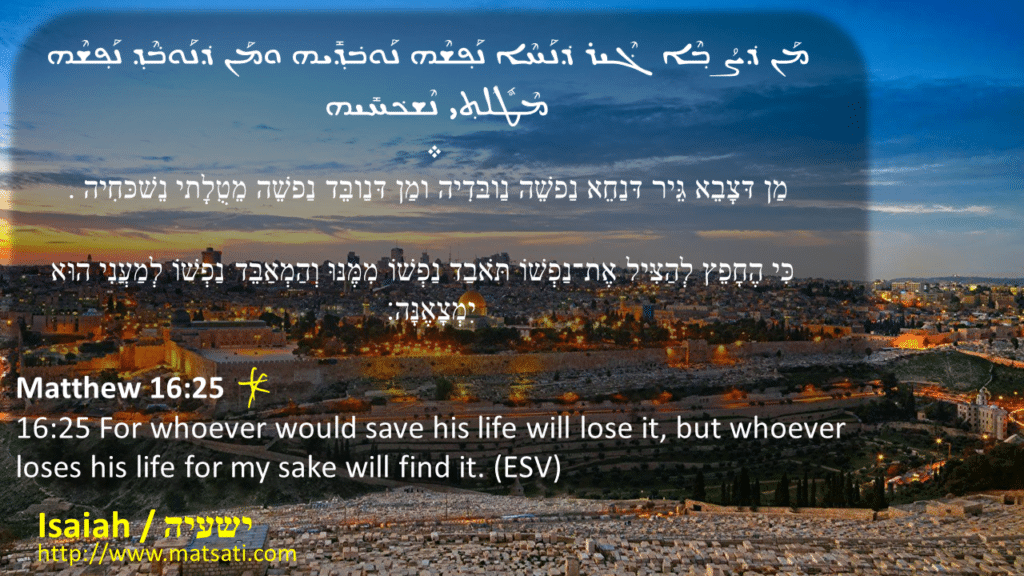
ܡܰܢ ܕ݁ܨܳܒ݂ܶܐ ܓ݁ܶܝܪ ܕ݁ܢܰܚܶܐ ܢܰܦ݂ܫܶܗ ܢܰܘܒ݁ܕ݂ܺܝܗ ܘܡܰܢ ܕ݁ܢܰܘܒ݁ܶܕ݂ ܢܰܦ݂ܫܶܗ ܡܶܛܽܠܳܬ݂ܝ ܢܶܫܟ݁ܚܺܝܗ
܀
מַן דּצָבֵא גֵּיר דּנַחֵא נַפשֵׁה נַובּדִיה ומַן דּנַובֵּד נַפשֵׁה מֵטֻלָתי נֵשׁכּחִיה .
כִּי הֶחָפֵץ לְהַצִּיל אֶת־נַפְשׁוֹ תֹּאבַד נַפְשׁוֹ מִמֶּנּוּ וְהַמְאַבֵּד נַפְשׁוֹ לְמַעֲנִי הוּא יִמְצָאֶנָּה׃
Matthew 16:25
16:25 For whoever would save his life will lose it, but whoever loses his life for my sake will find it. (ESV)
Here Isaiah states that “Of a truth many houses shall be desolate,” (אִם-לֹא בָּתִּים רַבִּים לְשַׁמָּה) and then says, “Yea, ten acres of vineyard shall yield one bath, (כִּי עֲשֶֹרֶת צִמְדֵּי-כֶרֶם יַעֲשֹוּ בַּת אֶחָת) and the seed of an homer shall yield an ephah. (וְזֶרַע חֹמֶר יַעֲשֶֹה אֵיפָה)” This desolate place will yield seed produce grain/fruit. This speaks to the need to purify the land, this is facilitated by the wicked receiving the consequences of their sins, destruction.
ספר ישעיה פרק ה
יא הוֹי מַשְׁכִּימֵי בַבֹּקֶר שֵׁכָר יִרְדֹּפוּ מְאַחֲרֵי בַנֶּשֶׁף יַיִן יַדְלִיקֵם: יב וְהָיָה כִנּוֹר וָנֶבֶל תֹּף וְחָלִיל וָיַיִן מִשְׁתֵּיהֶם וְאֵת פֹּעַל יְהֹוָה לֹא יַבִּיטוּ וּמַעֲשֵֹה יָדָיו לֹא רָאוּ:
Isaiah 5:11 states, “Woe unto them that rise up early in the morning, (הוֹי מַשְׁכִּימֵי בַבֹּקֶר) that they may follow strong drink; that continue until night, till wine inflame them! (שֵׁכָר יִרְדֹּפוּ מְאַחֲרֵי בַנֶּשֶׁף יַיִן יַדְלִיקֵם)” Isaiah 5:12 “And the harp, and the viol, the tabret, and pipe, and wine, are in their feasts: (וְהָיָה כִנּוֹר וָנֶבֶל תֹּף וְחָלִיל וָיַיִן מִשְׁתֵּיהֶם) but they regard not the work of the LORD, neither consider the operation of his hands. (וְאֵת פֹּעַל יְהֹוָה לֹא יַבִּיטוּ וּמַעֲשֵֹה יָדָיו לֹא רָאוּ)” The idea here is to the drunkard, those who chase after alcohol. This is analogous to dulling the senses by living in pleasure. Those who pursue these things וְאֵת פֹּעַל יְהֹוָה לֹא יַבִּיטוּ “they regard not the work of the Lord.” The reason this is so is because those who pursue sin have no interest in recognizing how God is at work in his or her life. The Mishnah Pirkei Avot 1:12 states, “… Hillel says: Be among the disciples of Aaron, loving peace and pursuing peace, loving people and bringing them close to Torah.” The rabbis of the Talmud say if God is not a part of the equation of life, all that remains is fire and two sides consume each other. A very Kabbalistic approach. The Torah is our guide to life and walking with God. We note that the Torah provides us with knowing how to pursue God and knowing the difference between whether we are actually pursuing God or simply a god fashioned in one’s own image. The Torah’s ultimate revelation is of the Messiah. Peter wrote according to 1 Peter 2:21 “For even hereunto were ye called: because Christ also suffered for us, leaving us an example, that ye should follow his steps.” Yeshua issued an invitation and a challenge to His disciples to “follow in His footsteps.” A major aspect of His message was that “I have come that you may have life, and that you may have it more abundantly.” (John 10:10) This is what the Lord wants for our lives, to follow in the footsteps of the Messiah and obey God’s holy Word!
Rabbinic Literature on Isaiah 4-5:1-12
The Targum Jonathan interprets Isaiah’s words in the following way:
תרגום יונתן בן עוזיאל אל ישעיה פרק ד:א-ו
א וְיַתקְפָן שְבַע נְשִין בְגֻברָא חַד בְעִדָנָא הַהוּא לְמֵימַר מִדִילַנָא נֵיכוּל וּמִדִילַנָא נִתכַסֵי לְחֹוד יִתקְרֵי שְמָך עְלַנָא כְנֹוש בַהְתַנָא׃ ב בְעִידָנָא הַהוּא יְהֵי מְשִיחָא דַיוי לְחַדוָא וְלִיקָר וְעָבְדֵי אֹורָיתָא לִרבוּ וּלתוּשבְחָא לְשֵיזָבַת יִשׂרָאֵל׃ ג וִיהֵי דְיִשתְאַר יְתוּב לְצִיֹון וְדַעְבַד אֹורָיתָא יִתקַיַים בִירוּשְלַם קַדִיש יִתאְמַר לֵיה כָל דִכתִיב בְחַיֵי עָלְמָא יִחזֵי בְנַחָמַת יְרוּשְלַם׃ ד אִם יַעדֵי יוי יָת תוּגאְלָת בְנָת צִיֹון וְיָת אָשְדֵי דַם זַכַי דְבִירוּשְלַם יַגלֵי מִגַוַה בְמֵימַר דִין וּבמֵימַר גְמֵירָא׃ ה וְיִברֵי יוי עַל כָל מַקדַש טוּרָא דְצִיֹון וְעַל אְתַר בֵית שְכִינְתָא עְנַן יְקָר יְהֵי מַטַל עִלָוֹוהִי בִימָמָא וַאְמִיטְתָא >וזיהור< כְאִישָא שַלהֹובִי בְלֵיליָא אְרֵי יַתִיר מִן יְקָרָא דַאְמִיר לְאֵיתָאָה עְלֹוהִי שְכִינְתָא תְהֵי מַגְנָא עְלֹוהִי כִגנוּן׃ ו וְעַל יְרוּשְלַם תְהֵי מְטַלַת עְנָנִי לְאַטָלָא עְלַה בִימַם מִשְרַב וּלבֵית סְתַר וּלאַגָנָא מִזָרָמִית וּמִמְטַר׃
תרגום יונתן בן עוזיאל אל ישעיה פרק ה:א-יב
א אְמַר נְבִייָא אְשַבְחֵיה כְעַן לְיִשׂרָאֵל דִמתִיל בְכַרמָא זַרעֵיה דְאַברָהָם רָחְמִי תוּשבְחַת רָחְמִי לְכַרמֵיה עַמִי חַבִיבִי יִשׂרָאֵל יְהַבִית לְהֹון אַחסָנָא בְטוּר רָם בַאְרַע שַמִינָא׃ ב וְקַדֵישתִנוּן וְיַקַרתִינוּן וְקַיֵימתִינוּן כְמִיצַב גַפַן בְחִירָא וּבנֵית מַקדְשִי בֵינֵיהֹון וְאַף מַדבְחִי יְהַבִית לְכַפָרָא עַל חְטָאֵיהֹון אְמַרִית דְיַעבְדוּן עוּבָדִין טָבִין וְאִינוּן אַבאִישוּ עֹובָדֵיהֹון׃ ג נְבִייָא אֵימַר לְהֹון הָא בֵית יִשׂרָאֵל מְרַדוּ מִן אֹורָיתָא וְלָא צָבַן לִמתָב וּכעַן יָתְבֵי יְרוּשְלַם וַאְנָש יְהוּדָה דִינוּ כְעַן דִינָא קֳדָמַי מִן עַמִי׃ ד מָא טָבָא אְמַרִית לְמַעְבַד עֹוד לְעַמִי וְלָא עְבַדִית לְהֹון מָא דֵין אְמַרִית דְיַעבְדוּן עוּבָדִין טָבִין וְאִינוּן אַבאִישוּ עוּבָדֵיהֹון׃ ה וּכעַן אְחַוֵי כְעַן לְכֹון יָת דַאְנָא עְתִיד לְמַעְבַד לְעַמִי אְסַלֵיק שְכִינְתִי מִנְהֹון וִיהֹון לְמִיבַז אְתָרַע בֵית מִקדְשֵיהֹון וִיהֹון לִדיָש׃ ו וַאְשַוֵינוּן רַטִישִין לָא יִסתַעְדוּן וְלָא יִסתַמכוּן וִיהֹון מְטֻלטְלִין וּשבִיקִין וְעַל נְבִיַיָא אְפַקֵיד דְלָא יִתנַבֹון עְלֵיהֹון נְבוּאָה׃ ז אְרֵי עַמֵיה דַיוי ”צְבָאֹות“ בֵית יִשׂרָאֵל וַאְנָש יְהוּדָה נִצבָא דְחַדוְתֵיה אְמַרִית דְיַעבְדוּן דִינָא וְהָא אָנֹוסִין דְיַעבְדוּן זָכוּ וְהָא אִינוּן מַסגַן חֹובִין׃ ח יֵי דְמַקְפִין בָא עַל בָא חְקַל אוּנסָא בְחַקלָתְהֹון מְקָרְבִין אָמְרִין עַד דְנַחסֵין כָל אְתַר וּמדַמַן דְיִתְבוּן בִלחֹודֵיהֹון בְגַוַה דְאַרעָא׃ ט אְמַר נְבִייָא בְאוּדְנַי הְוֵיתִי שָמַע כַד אִתגְזַרַת דָא מִן קֳדָם יוי ”צְבָאֹות“ אִם לָא בָתִין סַגִיאִין לְצָדוּ יְהֹון רַברְבִין וְטָבִין מִבְלִי יָתִיב׃ י אְרֵי בְחֹובָא דְלָא יְהַבוּ מַעשְׂרַיָא בֵית עְשַר אַשכְרָאִין דִכרַם יַעבְדוּן בַתָא חְדָא וּבֵית כֹור זְרַע יַעְבֵיד תְלָת סְאִין׃ יא יֵי דְמַקדְמִין בְצַפרָא לְמִשתֵי חְמַר עַתִיק רָדְפִין מְאַחְרִין לְמִפטַר מְרַמְשִין עַד שִוָיְהֹון חְמַר אוּנסָא מַלהֵיק לְהֹון׃ יב וְהָוֵי עַל יְדֵי כִנָר וּנבַל קַתרֹוס וַאְבוּבָא וְחַמרָא מִשתֵיהֹון וּבאֹורָיתָא דַיוי לָא אִסתַכַלוּ וְעֹובָד גְבוּרְתֵיה לָא חְזֹו׃
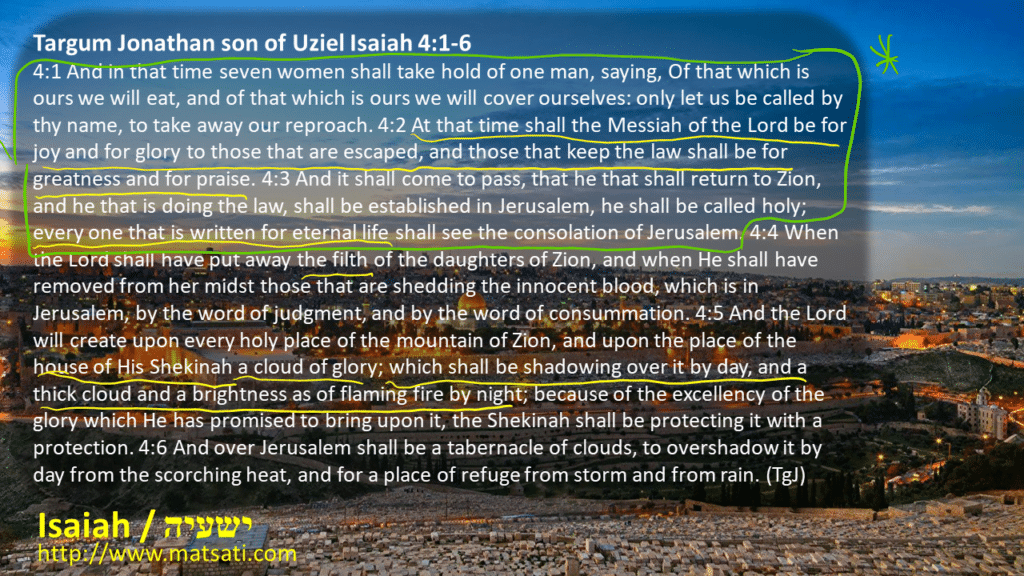
Targum Jonathan son of Uziel Isaiah 4:1-6
4:1 And in that time seven women shall take hold of one man, saying, Of that which is ours we will eat, and of that which is ours we will cover ourselves: only let us be called by thy name, to take away our reproach. 4:2 At that time shall the Messiah of the Lord be for joy and for glory to those that are escaped, and those that keep the law shall be for greatness and for praise. 4:3 And it shall come to pass, that he that shall return to Zion, and he that is doing the law, shall be established in Jerusalem, he shall be called holy; every one that is written for eternal life shall see the consolation of Jerusalem. 4:4 When the Lord shall have put away the filth of the daughters of Zion, and when He shall have removed from her midst those that are shedding the innocent blood, which is in Jerusalem, by the word of judgment, and by the word of consummation. 4:5 And the Lord will create upon every holy place of the mountain of Zion, and upon the place of the house of His Shekinah a cloud of glory; which shall be shadowing over it by day, and a thick cloud and a brightness as of flaming fire by night; because of the excellency of the glory which He has promised to bring upon it, the Shekinah shall be protecting it with a protection. 4:6 And over Jerusalem shall be a tabernacle of clouds, to overshadow it by day from the scorching heat, and for a place of refuge from storm and from rain. (TgJ)
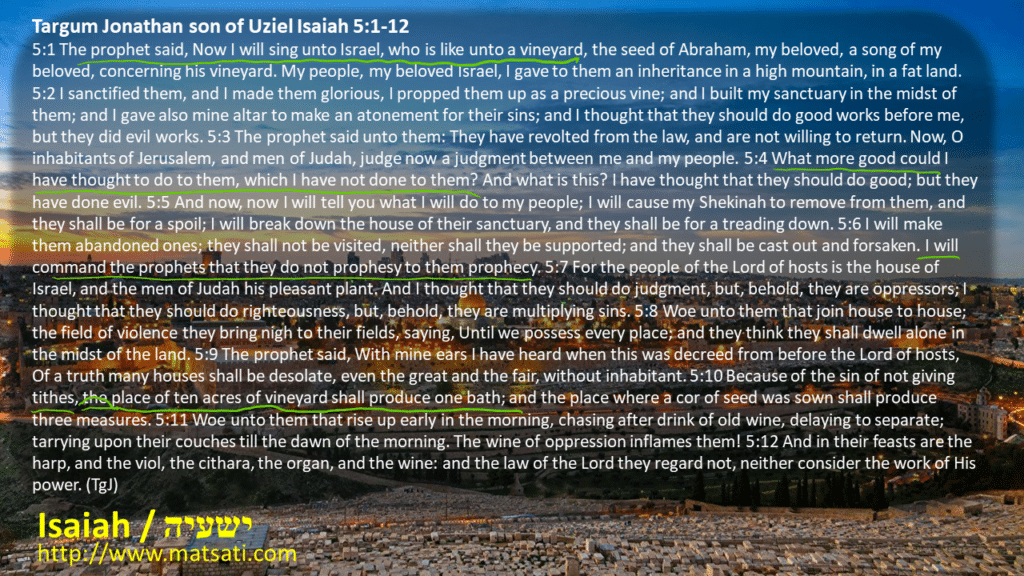
Targum Jonathan son of Uziel Isaiah 5:1-12
5:1 The prophet said, Now I will sing unto Israel, who is like unto a vineyard, the seed of Abraham, my beloved, a song of my beloved, concerning his vineyard. My people, my beloved Israel, I gave to them an inheritance in a high mountain, in a fat land. 5:2 I sanctified them, and I made them glorious, I propped them up as a precious vine; and I built my sanctuary in the midst of them; and I gave also mine altar to make an atonement for their sins; and I thought that they should do good works before me, but they did evil works. 5:3 The prophet said unto them: They have revolted from the law, and are not willing to return. Now, O inhabitants of Jerusalem, and men of Judah, judge now a judgment between me and my people. 5:4 What more good could I have thought to do to them, which I have not done to them? And what is this? I have thought that they should do good; but they have done evil. 5:5 And now, now I will tell you what I will do to my people; I will cause my Shekinah to remove from them, and they shall be for a spoil; I will break down the house of their sanctuary, and they shall be for a treading down. 5:6 I will make them abandoned ones; they shall not be visited, neither shall they be supported; and they shall be cast out and forsaken. I will command the prophets that they do not prophesy to them prophecy. 5:7 For the people of the Lord of hosts is the house of Israel, and the men of Judah his pleasant plant. And I thought that they should do judgment, but, behold, they are oppressors; I thought that they should do righteousness, but, behold, they are multiplying sins. 5:8 Woe unto them that join house to house; the field of violence they bring nigh to their fields, saying, Until we possess every place; and they think they shall dwell alone in the midst of the land. 5:9 The prophet said, With mine ears I have heard when this was decreed from before the Lord of hosts, Of a truth many houses shall be desolate, even the great and the fair, without inhabitant. 5:10 Because of the sin of not giving tithes, the place of ten acres of vineyard shall produce one bath; and the place where a cor of seed was sown shall produce three measures. 5:11 Woe unto them that rise up early in the morning, chasing after drink of old wine, delaying to separate; tarrying upon their couches till the dawn of the morning. The wine of oppression inflames them! 5:12 And in their feasts are the harp, and the viol, the cithara, the organ, and the wine: and the law of the Lord they regard not, neither consider the work of His power. (TgJ)
The Targum Jonathan on Isaiah 4 states, ב בְעִידָנָא הַהוּא יְהֵי מְשִיחָא דַיוי לְחַדוָא וְלִיקָר וְעָבְדֵי אֹורָיתָא לִרבוּ וּלתוּשבְחָא לְשֵיזָבַת יִשׂרָאֵל׃ ג וִיהֵי דְיִשתְאַר יְתוּב לְצִיֹון וְדַעְבַד אֹורָיתָא יִתקַיַים בִירוּשְלַם קַדִיש יִתאְמַר לֵיה כָל דִכתִיב בְחַיֵי עָלְמָא יִחזֵי בְנַחָמַת יְרוּשְלַם׃ 4:2 At that time shall the Messiah of the Lord be for joy and for glory to those that are escaped, and those that keep the law shall be for greatness and for praise. 4:3 And it shall come to pass, that he that shall return to Zion, and he that is doing the law, shall be established in Jerusalem, he shall be called holy; every one that is written for eternal life shall see the consolation of Jerusalem. (TgJ) Here we find the rabbinic expectation of the Messiah in the midst of the troubles of Israel. Jewish history is filled with the anticipation of the coming of the Messiah. These things, such as the aramaic translation of the Neviim (Prophets) speak to us as evidence for this from a pre-Chrisitan context. The Talmud Megillah 3a attributes the Targum authorship to Jonathan ben Uzziel, a pupil of Hillel the Elder. According to this source, it was composed by Jonathan ben Uzziel “from the mouths of Haggai, Zechariah, and Malachi,” implying that it was based on traditions derived from the last prophets placing the translation in antiquity. Both biblical and apocryphal writings (i.e. the Dead Sea Scrolls) near the turn of the century (BC to AD) led to a remarkable increase in messianic expectation. This is likely due to the Roman oppression of the time. This may have been in preparation for the emergence of God’s Messiah Yeshua, a young rabbi from Nazareth. His teachings and prophetic insights, miracles, and working in the power of God stirred the crowd with much messianic fervor, and provoked his enemies to put him to death (John 11:45-53). In addition to this, Josephous also makes a record of Yeshua being the Messiah in the context of the period of the Millennium being ushered in. The point is that the targum translation provides for us an expectation of the Messiah which was also coupled to the obedience of God’s people to the Torah of God and of having one’s name written in God’s book of life.
Ibn Ezra states the following concerning Isaiah 4:2, ב בַּיּוֹם הַהוּא יִהְיֶה צֶמַח יְהֹוָה לִצְבִי וּלְכָבוֹד וּפְרִי הָאָרֶץ לְגָאוֹן וּלְתִפְאֶרֶת לִפְלֵיטַת יִשְֹרָאֵל “In that day shall the branch of the LORD be beautiful and glorious, (בַּיּוֹם הַהוּא יִהְיֶה צֶמַח יְהֹוָה לִצְבִי וּלְכָבוֹד) and the fruit of the earth shall be excellent and comely (וּפְרִי הָאָרֶץ לְגָאוֹן וּלְתִפְאֶרֶת) for them that are escaped of Israel. (לִפְלֵיטַת יִשְֹרָאֵל)”
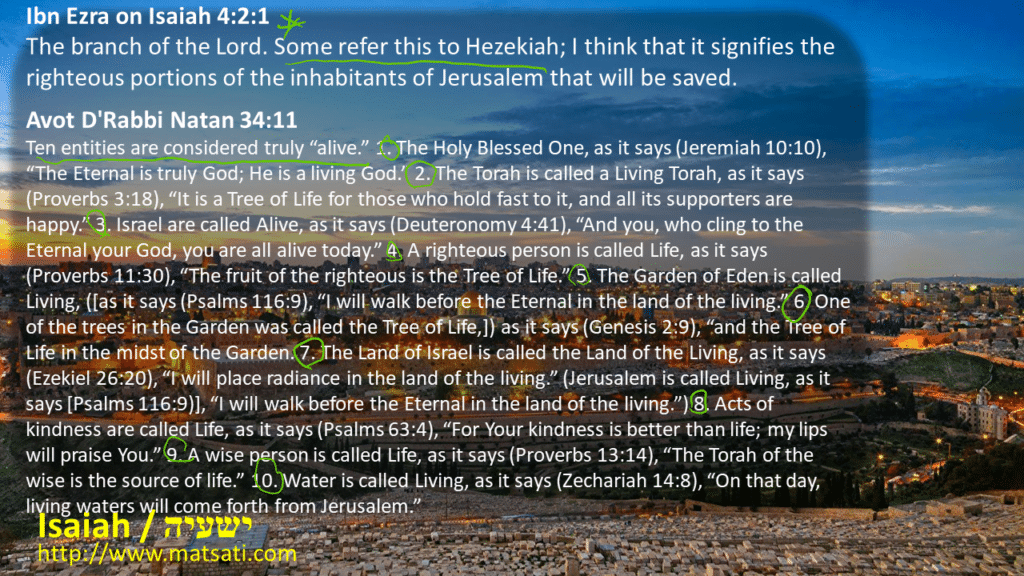
Ibn Ezra on Isaiah 4:2 Part 1
The branch of the Lord. Some refer this to Hezekiah; I think that it signifies the righteous portions of the inhabitants of Jerusalem that will be saved.
Ibn Ezra believes the branch of the Lord is a reference to Hezekiah. Hezekiah was a son of a godless father, King Ahaz (2 Kings 16:2-4). Yet we are told that Hezekiah did “right in the sight of the Lord” (2 Kings 18:3). This shows Hezekiah’s strength and resolve to forsake the way of his father and walk in the way of God. Hezekiah removed the Pagan altars, idols, and temples were destroyed. The bronze serpent that Moses had made in the desert (Bamidbar / Numbers 21:9) was also destroyed, because the people had made it an idol (2 Kings 18:4). The temple in Jerusalem, whose doors had been nailed shut by Hezekiah’s own father, was cleaned out and reopened. The Levitical priesthood was reinstated (2 Chronicles 29:5), and the Passover was reinstituted as a national holiday (2 Chronicles 30:1). It is not surprising Ibn Ezra considers Hezekiah the branch of God.
Targum Jonathan continues saying the following, ג וִיהֵי דְיִשתְאַר יְתוּב לְצִיֹון וְדַעְבַד אֹורָיתָא יִתקַיַים בִירוּשְלַם קַדִיש יִתאְמַר לֵיה כָל דִכתִיב בְחַיֵי עָלְמָא יִחזֵי בְנַחָמַת יְרוּשְלַם׃ 4:3 And it shall come to pass, that he that shall return to Zion, and he that is doing the law, shall be established in Jerusalem, he shall be called holy; every one that is written for eternal life shall see the consolation of Jerusalem. (TgJ) Jonathan interprets the one who returns as the one who loves the Lord and walks in His commands, and has his name written in the book for eternal life. It is interesting how Avot D’Rabbi Natan describes these things.
Avot D’Rabbi Natan 34:11
Ten entities are considered truly “alive.” 1. The Holy Blessed One, as it says (Jeremiah 10:10), “The Eternal is truly God; He is a living God.” 2. The Torah is called a Living Torah, as it says (Proverbs 3:18), “It is a Tree of Life for those who hold fast to it, and all its supporters are happy.” 3. Israel are called Alive, as it says (Deuteronomy 4:41), “And you, who cling to the Eternal your God, you are all alive today.” 4. A righteous person is called Life, as it says (Proverbs 11:30), “The fruit of the righteous is the Tree of Life.” 5. The Garden of Eden is called Living, ([as it says (Psalms 116:9), “I will walk before the Eternal in the land of the living.” 6. One of the trees in the Garden was called the Tree of Life,]) as it says (Genesis 2:9), “and the Tree of Life in the midst of the Garden. 7. The Land of Israel is called the Land of the Living, as it says (Ezekiel 26:20), “I will place radiance in the land of the living.” (Jerusalem is called Living, as it says [Psalms 116:9)], “I will walk before the Eternal in the land of the living.”) 8. Acts of kindness are called Life, as it says (Psalms 63:4), “For Your kindness is better than life; my lips will praise You.” 9. A wise person is called Life, as it says (Proverbs 13:14), “The Torah of the wise is the source of life.” 10. Water is called Living, as it says (Zechariah 14:8), “On that day, living waters will come forth from Jerusalem.”
Notice how significant this commentary is concerning the Torah as the author states that there are ten things that are considered for one to be truly alive! The way the rabbis describe these things is quite remarkable. The rabbis always place a positive twist to the Torah commands, and history bares out what happens when God’s people forsake His holy instructions for life. The NT text tells us that the Torah is holy, righteous and good (Romans 7:12), but those seeking righteousness based upon the Torah’s requirements will discover the tragic fact that the Torah is powerless to impart righteousness and life (2 Corinthians 3:7-18) without God’s help, leading, and empowering through His Spirit and presence in our lives. The righteousness of God is given through faith (Romans 8) and the righteous will live by their faith to obey God’s Word! Note how these things are connected to the Messianic expectation of the Messiah who is sent from God to save His people. The Talmud states the following concerning Isaiah 4:2.
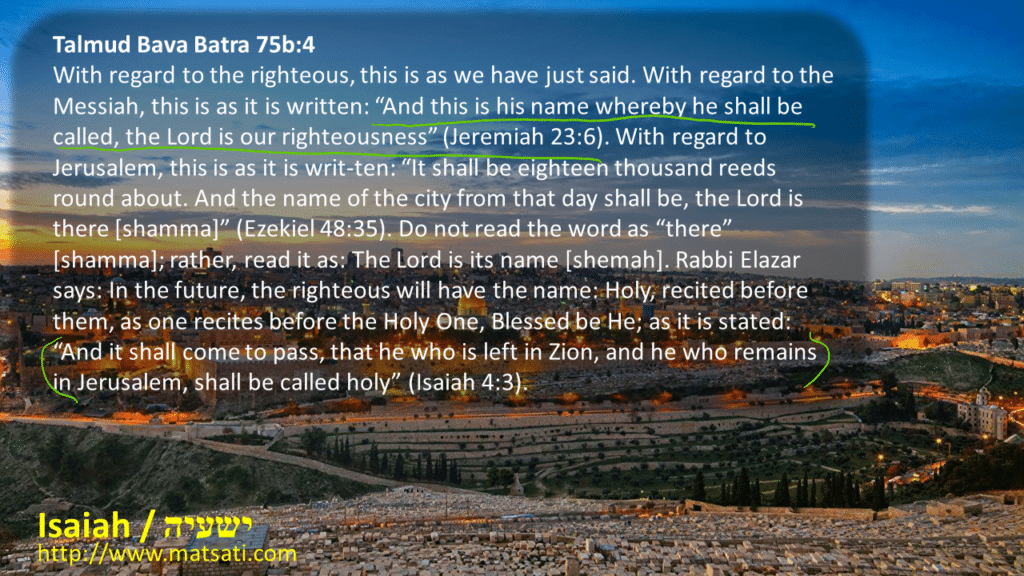
Talmud Bava Batra 75b:4
With regard to the righteous, this is as we have just said. With regard to the Messiah, this is as it is written: “And this is his name whereby he shall be called, the Lord is our righteousness” (Jeremiah 23:6). With regard to Jerusalem, this is as it is writ-ten: “It shall be eighteen thousand reeds round about. And the name of the city from that day shall be, the Lord is there [shamma]” (Ezekiel 48:35). Do not read the word as “there” [shamma]; rather, read it as: The Lord is its name [shemah]. Rabbi Elazar says: In the future, the righteous will have the name: Holy, recited before them, as one recites before the Holy One, Blessed be He; as it is stated: “And it shall come to pass, that he who is left in Zion, and he who remains in Jerusalem, shall be called holy” (Isaiah 4:3).
Here the rabbis speak of these verses again in regards to the Messiah and cite Jeremiah 23:6 “And this is his name whereby he shall be called, the Lord is our righteousness” as referring to the One whom God sends speaking of the righteousness of God that is in the Messiah. The Talmud speaks of the redemption that is brought by the hand of the Messiah through the Name of God (HaShem) tying this to what we read in Isaiah 4:3 that those who return and/or who remain will be called holy. Something to note about all of these things, in the context of Paul and the NT text. Looking at a few select texts:
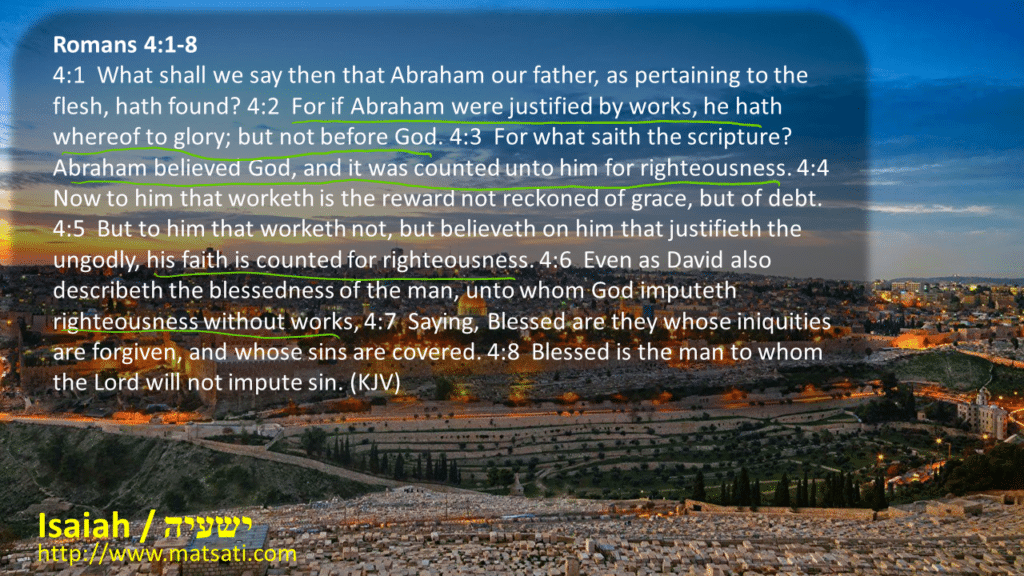
Romans 4:1-8
4:1 What shall we say then that Abraham our father, as pertaining to the flesh, hath found? 4:2 For if Abraham were justified by works, he hath whereof to glory; but not before God. 4:3 For what saith the scripture? Abraham believed God, and it was counted unto him for righteousness. 4:4 Now to him that worketh is the reward not reckoned of grace, but of debt. 4:5 But to him that worketh not, but believeth on him that justifieth the ungodly, his faith is counted for righteousness. 4:6 Even as David also describeth the blessedness of the man, unto whom God imputeth righteousness without works, 4:7 Saying, Blessed are they whose iniquities are forgiven, and whose sins are covered. 4:8 Blessed is the man to whom the Lord will not impute sin. (KJV)
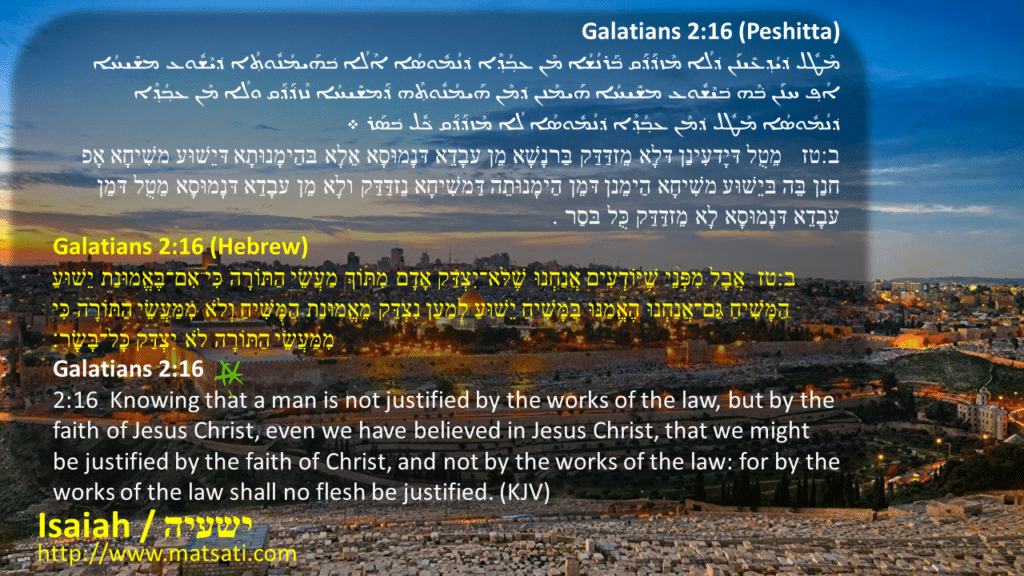
Galatians 2:16 (Peshitta)
ܡܶܛܽܠ ܕ݁ܝܳܕ݂ܥܺܝܢܰܢ ܕ݁ܠܳܐ ܡܶܙܕ݁ܰܕ݁ܰܩ ܒ݁ܰܪܢܳܫܳܐ ܡܶܢ ܥܒ݂ܳܕ݂ܶܐ ܕ݁ܢܳܡܽܘܣܳܐ ܐܶܠܳܐ ܒ݁ܗܰܝܡܳܢܽܘܬ݂ܳܐ ܕ݁ܝܶܫܽܘܥ ܡܫܺܝܚܳܐ ܐܳܦ݂ ܚܢܰܢ ܒ݁ܶܗ ܒ݁ܝܶܫܽܘܥ ܡܫܺܝܚܳܐ ܗܰܝܡܶܢܢ ܕ݁ܡܶܢ ܗܰܝܡܳܢܽܘܬ݂ܶܗ ܕ݁ܰܡܫܺܝܚܳܐ ܢܶܙܕ݁ܰܕ݁ܰܩ ܘܠܳܐ ܡܶܢ ܥܒ݂ܳܕ݂ܶܐ ܕ݁ܢܳܡܽܘܣܳܐ ܡܶܛܽܠ ܕ݁ܡܶܢ ܥܒ݂ܳܕ݂ܶܐ ܕ݁ܢܳܡܽܘܣܳܐ ܠܳܐ ܡܶܙܕ݁ܰܕ݁ܰܩ ܟ݁ܽܠ ܒ݁ܣܰܪ ܀
ב:טז מֵטֻל דּיָדעִינַן דּלָא מֵזדַּדַּק בַּרנָשָׁא מֵן עבָדֵא דּנָמוּסָא אֵלָא בּהַימָנוּתָא דּיֵשׁוּע משִׁיחָא אָפ חנַן בֵּה בּיֵשׁוּע משִׁיחָא הַימֵנן דּמֵן הַימָנוּתֵה דַּמשִׁיחָא נֵזדַּדַּק ולָא מֵן עבָדֵא דּנָמוּסָא מֵטֻל דּמֵן עבָדֵא דּנָמוּסָא לָא מֵזדַּדַּק כֻּל בּסַר .
Galatians 2:16 (Hebrew)
ב:טז אֲבָל מִפְּנֵי שֶׁיּוֹדְעִים אֲנַחְנוּ שֶׁלּא־יִצְדַּק אָדָם מִתּוֹךְ מַעֲשֵׂי הַתּוֹרָה כִּי אִם־בֶּאֱמוּנַת יֵשׁוּעַ הַמָּשִׁיחַ גַּם־אֲנַחְנוּ הֶאֱמַנּוּ בַּמָּשִׁיחַ יֵשׁוּעַ לְמַעַן נִצְדַּק מֵאֱמוּנַת הַמָּשִׁיחַ וְלֹא מִמַּעֲשֵׂי הַתּוֹרָה כִּי מִמַּעֲשֵׂי הַתּוֹרָה לֹא יִצְדַּק כָּל־בָּשָׂר׃
Galatians 2:16
2:16 Knowing that a man is not justified by the works of the law, but by the faith of Jesus Christ, even we have believed in Jesus Christ, that we might be justified by the faith of Christ, and not by the works of the law: for by the works of the law shall no flesh be justified. (KJV)
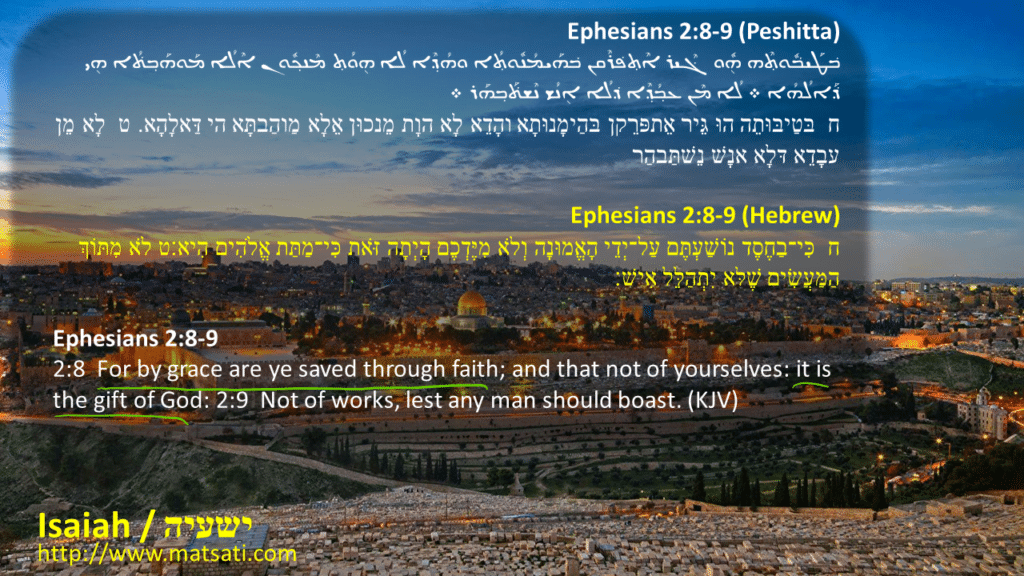
Ephesians 2:8-9 (Peshitta)
ܒ݁ܛܰܝܒ݁ܽܘܬ݂ܶܗ ܗ݈ܽܘ ܓ݁ܶܝܪ ܐܶܬ݂ܦ݁ܪܶܩܢ ܒ݁ܗܰܝܡܳܢܽܘܬ݂ܳܐ ܘܗܳܕ݂ܶܐ ܠܳܐ ܗ݈ܘܳܬ݂ ܡܶܢܟ݂ܽܘܢ ܐܶܠܳܐ ܡܰܘܗܰܒ݂ܬ݁ܳܐ ܗ݈ܝ ܕ݁ܰܐܠܳܗܳܐ ܀ ܠܳܐ ܡܶܢ ܥܒ݂ܳܕ݂ܶܐ ܕ݁ܠܳܐ ܐ݈ܢܳܫ ܢܶܫܬ݁ܰܒ݂ܗܰܪ ܀
ח בּטַיבּוּתֵה הוּ גֵּיר אֵתפּרֵקן בּהַימָנוּתָא והָדֵא לָא הוָת מֵנכוּן אֵלָא מַוהַבתָּא הי דַּאלָהָא. ט לָא מֵן עבָדֵא דּלָא אנָשׁ נֵשׁתַּבהַר
Ephesians 2:8-9 (Hebrew)
ח כִּי־בַחֶסֶד נוֹשַׁעְתֶּם עַל־יְדֵי הָאֱמוּנָה וְלֹא מִיֶּדְכֶם הָיְתָה זֹּאת כִּי־מַתַּת אֱלֹהִים הִיא׃ט לֹא מִתּוֹךְ הַמַּעֲשִׂים שֶׁלּא יִתְהַלֵּל אִישׁ׃
Ephesians 2:8-9
2:8 For by grace are ye saved through faith; and that not of yourselves: it is the gift of God: 2:9 Not of works, lest any man should boast. (KJV)
We note what Paul seems to be saying, the typical interpretation is that man earned his salvation by seeking righteousness and justification before God through the Torah, but now we receive righteousness by the free gift of the Messiah’s righteousness imputed to us through our faith and trust in him. The truth of the matter is that man did not earn his salvation but has always trusted in God for forgiveness of sins according to the scriptures. The Scriptures speak of seeking the righteousness of God by faith, and our living out our faith in our lives as well. The NT text speaks of abiding in the Messiah and of the power of God in our lives by His presence through the Holy Spirit in our lives to overcome sin. The very nature of sin itself based upon the Scriptures is to disobey God’s commands. We note that the call to walk according to the Spirit is given to us throughout the Scriptures, in the Torah it is by the way of the circumcised heart, something only God can do, and in the NT it is by the presence of God through the Holy Spirit. To walk in the Spirit one is not sinning, meaning that one is obeying God’s Word, walking in obedience and not disobedience. All of these concepts must be brought into context in order to understand what Paul was saying. Even though we are not able to be perfect at all times, we occasionally sin, this does not mean that we are to disregard God’s commands. The faith that we have in the Messiah and the righteousness of Yeshua in our lives, this does not mean that we no longer are expected to walk in truth, righteousness, holiness, and justice before God and men. This is the point of Avot D’Rabbi Natan 34:11 that speaks of the Torah and the ten things that are considered for one to be truly alive! These things are also consistent with what Isaiah is saying according to Isaiah 4:4.
Isaiah 4:4, ד אִם יַעדֵי יוי יָת תוּגאְלָת בְנָת צִיֹון וְיָת אָשְדֵי דַם זַכַי דְבִירוּשְלַם יַגלֵי מִגַוַה בְמֵימַר דִין וּבמֵימַר גְמֵירָא׃ 4:4 When the Lord shall have put away the filth of the daughters of Zion, and when He shall have removed from her midst those that are shedding the innocent blood, which is in Jerusalem, by the word of judgment, and by the word of consummation. (TgJ) Notice how it is the Lord God Almighty who is putting away the filth of the people. Notice how this is a work of God and not as modern theologies claim that man earned his salvation, righteousness, and right standing before God in the old testament. Notice how inconsistent this theology really is. Rashi agrees saying the following:
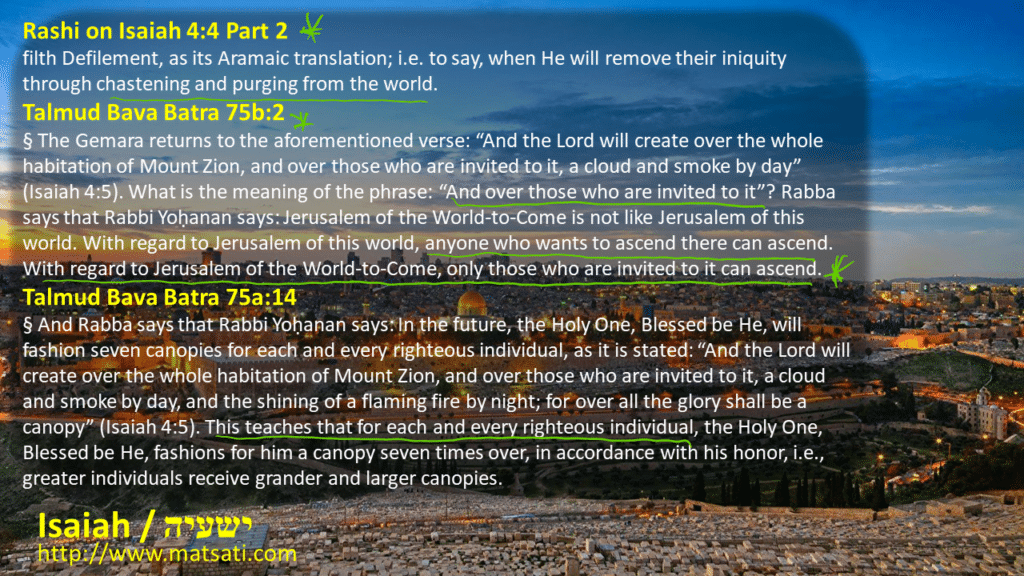
Rashi on Isaiah 4:4 Part 2
filth Defilement, as its Aramaic translation; i.e. to say, when He will remove their iniquity through chastening and purging from the world.
Here Rashi states that this filth, the sin of the people through idolatry, pride, and sexual sin, their iniquity is removed through chastising and purging from the world. Their sins have led to their death. Note how this is consistent with what Paul taught according to 1 Corinthians 11:30-31 when he said, “For this cause many are weak and sickly among you, and many sleep. For if we would judge ourselves, we should not be judged.” Note the Greek word κοιμωνται literally means “sleep” which is an expression meaning that one is dead or has died. Isaiah continues according to the Targum translation to say the following:
Isaiah 4:5-6 states the following, ה וְיִברֵי יוי עַל כָל מַקדַש טוּרָא דְצִיֹון וְעַל אְתַר בֵית שְכִינְתָא עְנַן יְקָר יְהֵי מַטַל עִלָוֹוהִי בִימָמָא וַאְמִיטְתָא >וזיהור< כְאִישָא שַלהֹובִי בְלֵיליָא אְרֵי יַתִיר מִן יְקָרָא דַאְמִיר לְאֵיתָאָה עְלֹוהִי שְכִינְתָא תְהֵי מַגְנָא עְלֹוהִי כִגנוּן׃ ו וְעַל יְרוּשְלַם תְהֵי מְטַלַת עְנָנִי לְאַטָלָא עְלַה בִימַם מִשְרַב וּלבֵית סְתַר וּלאַגָנָא מִזָרָמִית וּמִמְטַר׃ 4:5 And the Lord will create upon every holy place of the mountain of Zion, and upon the place of the house of His Shekinah a cloud of glory; which shall be shadowing over it by day, and a thick cloud and a brightness as of flaming fire by night; because of the excellency of the glory which He has promised to bring upon it, the Shekinah shall be protecting it with a protection. 4:6 And over Jerusalem shall be a tabernacle of clouds, to overshadow it by day from the scorching heat, and for a place of refuge from storm and from rain. (TgJ) Jonathan interprets Isaiah’s words to describe the Shekinah glory of God overshadowing the mountain of God and those who abide therein. The Talmud states the following concerning this:
Talmud Bava Batra 75b:2
§ The Gemara returns to the aforementioned verse: “And the Lord will create over the whole habitation of Mount Zion, and over those who are invited to it, a cloud and smoke by day” (Isaiah 4:5). What is the meaning of the phrase: “And over those who are invited to it”? Rabba says that Rabbi Yoḥanan says: Jerusalem of the World-to-Come is not like Jerusalem of this world. With regard to Jerusalem of this world, anyone who wants to ascend there can ascend. With regard to Jerusalem of the World-to-Come, only those who are invited to it can ascend.
Talmud Bava Batra 75a:14
§ And Rabba says that Rabbi Yoḥanan says: In the future, the Holy One, Blessed be He, will fashion seven canopies for each and every righteous individual, as it is stated: “And the Lord will create over the whole habitation of Mount Zion, and over those who are invited to it, a cloud and smoke by day, and the shining of a flaming fire by night; for over all the glory shall be a canopy” (Isaiah 4:5). This teaches that for each and every righteous individual, the Holy One, Blessed be He, fashions for him a canopy seven times over, in accordance with his honor, i.e., greater individuals receive grander and larger canopies.
The rabbis draw out a good point that we are invited to the Olam Haba (world to come). In the case of the temple in Jerusalem, one may ascend on one’s own, whereas to enter into heaven one is by invitation only. Note how this interpretation is consistent with the idea that man doesn’t earn his way into heaven. The ancient understanding of the Torah was and remains a function of the covenant relationship. The Torah was given to people who are in a covenant relationship with God, having been given instructions on how to live when we literally have the presence of God dwelling in our midst. Notice the picture that is being put together regarding faith and faithfulness.
Isaiah 5:1, א אְמַר נְבִייָא אְשַבְחֵיה כְעַן לְיִשׂרָאֵל דִמתִיל בְכַרמָא זַרעֵיה דְאַברָהָם רָחְמִי תוּשבְחַת רָחְמִי לְכַרמֵיה עַמִי חַבִיבִי יִשׂרָאֵל יְהַבִית לְהֹון אַחסָנָא בְטוּר רָם בַאְרַע שַמִינָא׃ 5:1 The prophet said, Now I will sing unto Israel, who is like unto a vineyard, the seed of Abraham, my beloved, a song of my beloved, concerning his vineyard. My people, my beloved Israel, I gave to them an inheritance in a high mountain, in a fat land. ב וְקַדֵישתִנוּן וְיַקַרתִינוּן וְקַיֵימתִינוּן כְמִיצַב גַפַן בְחִירָא וּבנֵית מַקדְשִי בֵינֵיהֹון וְאַף מַדבְחִי יְהַבִית לְכַפָרָא עַל חְטָאֵיהֹון אְמַרִית דְיַעבְדוּן עוּבָדִין טָבִין וְאִינוּן אַבאִישוּ עֹובָדֵיהֹון׃ 5:2 I sanctified them, and I made them glorious, I propped them up as a precious vine; and I built my sanctuary in the midst of them; and I gave also mine altar to make an atonement for their sins; and I thought that they should do good works before me, but they did evil works. ג נְבִייָא אֵימַר לְהֹון הָא בֵית יִשׂרָאֵל מְרַדוּ מִן אֹורָיתָא וְלָא צָבַן לִמתָב וּכעַן יָתְבֵי יְרוּשְלַם וַאְנָש יְהוּדָה דִינוּ כְעַן דִינָא קֳדָמַי מִן עַמִי׃ 5:3 The prophet said unto them: They have revolted from the law, and are not willing to return. Now, O inhabitants of Jerusalem, and men of Judah, judge now a judgment between me and my people. (TgJ) We note what Paul said according to Galatians 3:7, those who are of faith are the children of Abraham. “The seed of Abraham” here according to the TgJ translation of Isaiah 5:1 draws out the discussion on this topic in John 8:31-59. The Jewish people are the children of Abraham, God’s “Chosen People” and often referred to themselves as the “Children of Abraham.” It is believed, even today, that this relationship of being born Jewish constitutes automatically being in a covenant with God and this assures (guarantees) one’s entry into Heaven. It is interesting however the Talmud describes the entry into heaven, in the world to come, is on invitation, and depends upon the response of the one who was invited! Notice how Sifrei Devarim 306:1 describes these things.
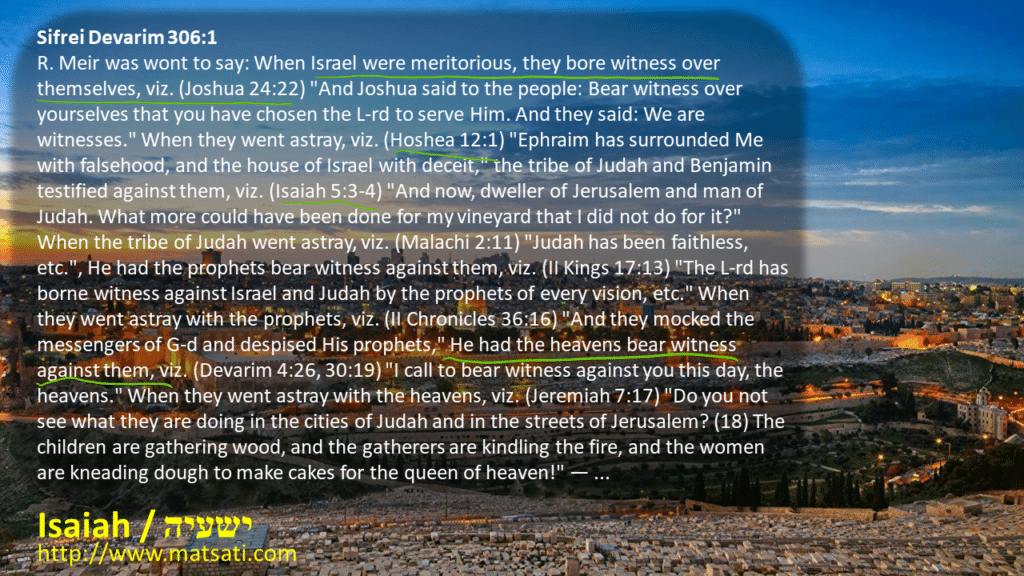
Sifrei Devarim 306:1
R. Meir was wont to say: When Israel were meritorious, they bore witness over themselves, viz. (Joshua 24:22) “And Joshua said to the people: Bear witness over yourselves that you have chosen the L-rd to serve Him. And they said: We are witnesses.” When they went astray, viz. (Hoshea 12:1) “Ephraim has surrounded Me with falsehood, and the house of Israel with deceit,” the tribe of Judah and Benjamin testified against them, viz. (Isaiah 5:3-4) “And now, dweller of Jerusalem and man of Judah. What more could have been done for my vineyard that I did not do for it?” When the tribe of Judah went astray, viz. (Malachi 2:11) “Judah has been faithless, etc.”, He had the prophets bear witness against them, viz. (II Kings 17:13) “The L-rd has borne witness against Israel and Judah by the prophets of every vision, etc.” When they went astray with the prophets, viz. (II Chronicles 36:16) “And they mocked the messengers of G-d and despised His prophets,” He had the heavens bear witness against them, viz. (Devarim 4:26, 30:19) “I call to bear witness against you this day, the heavens.” When they went astray with the heavens, viz. (Jeremiah 7:17) “Do you not see what they are doing in the cities of Judah and in the streets of Jerusalem? (18) The children are gathering wood, and the gatherers are kindling the fire, and the women are kneading dough to make cakes for the queen of heaven!” — …
The idea is that one’s deeds will function as a testimony to bear witness of whether one has chosen to serve the Lord or not! The idea here is how easy it is to bear false witness, and even to the disregard of God’s Word and invitation (calling) on our lives, even to the substitution of worship of God to the worship of idols which can be any material thing. Isaiah continues saying the following according to the Targum.
Isaiah 5:4, ד מָא טָבָא אְמַרִית לְמַעְבַד עֹוד לְעַמִי וְלָא עְבַדִית לְהֹון מָא דֵין אְמַרִית דְיַעבְדוּן עוּבָדִין טָבִין וְאִינוּן אַבאִישוּ עוּבָדֵיהֹון׃ 5:4 What more good could I have thought to do to them, which I have not done to them? And what is this? I have thought that they should do good; but they have done evil. ה וּכעַן אְחַוֵי כְעַן לְכֹון יָת דַאְנָא עְתִיד לְמַעְבַד לְעַמִי אְסַלֵיק שְכִינְתִי מִנְהֹון וִיהֹון לְמִיבַז אְתָרַע בֵית מִקדְשֵיהֹון וִיהֹון לִדיָש׃ 5:5 And now, now I will tell you what I will do to my people; I will cause my Shekinah to remove from them, and they shall be for a spoil; I will break down the house of their sanctuary, and they shall be for a treading down. ו וַאְשַוֵינוּן רַטִישִין לָא יִסתַעְדוּן וְלָא יִסתַמכוּן וִיהֹון מְטֻלטְלִין וּשבִיקִין וְעַל נְבִיַיָא אְפַקֵיד דְלָא יִתנַבֹון עְלֵיהֹון נְבוּאָה׃ 5:6 I will make them abandoned ones; they shall not be visited, neither shall they be supported; and they shall be cast out and forsaken. I will command the prophets that they do not prophesy to them prophecy. ז אְרֵי עַמֵיה דַיוי ”צְבָאֹות“ בֵית יִשׂרָאֵל וַאְנָש יְהוּדָה נִצבָא דְחַדוְתֵיה אְמַרִית דְיַעבְדוּן דִינָא וְהָא אָנֹוסִין דְיַעבְדוּן זָכוּ וְהָא אִינוּן מַסגַן חֹובִין׃ 5:7 For the people of the Lord of hosts is the house of Israel, and the men of Judah his pleasant plant. And I thought that they should do judgment, but, behold, they are oppressors; I thought that they should do righteousness, but, behold, they are multiplying sins. (TgJ) Note from the context of a nation, concerning those who are unfaithful, when the unfaithful reach a critical mass the result is the removal of what God has blessed the people with, His tabernacle, His Shekinah, their financial success, and even the removal of a prophetic word from their prophets. The midrash on Mishley / Proverbs comments on Isaiah 5:7 in the following way.
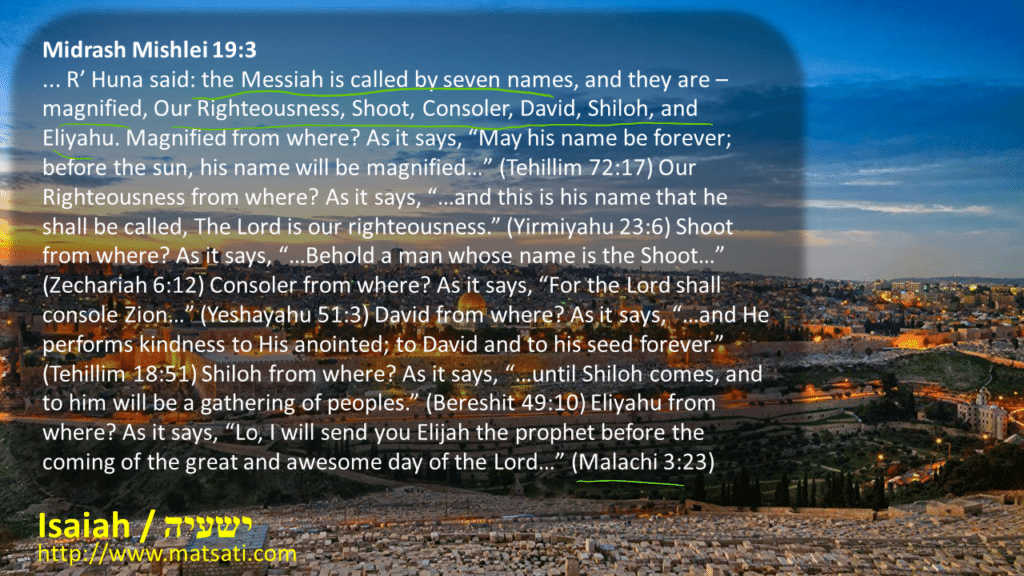
Midrash Mishlei 19:3
… R’ Huna said: the Messiah is called by seven names, and they are – magnified, Our Righteousness, Shoot, Consoler, David, Shiloh, and Eliyahu. Magnified from where? As it says, “May his name be forever; before the sun, his name will be magnified…” (Tehillim 72:17) Our Righteousness from where? As it says, “…and this is his name that he shall be called, The Lord is our righteousness.” (Yirmiyahu 23:6) Shoot from where? As it says, “…Behold a man whose name is the Shoot…” (Zechariah 6:12) Consoler from where? As it says, “For the Lord shall console Zion…” (Yeshayahu 51:3) David from where? As it says, “…and He performs kindness to His anointed; to David and to his seed forever.” (Tehillim 18:51) Shiloh from where? As it says, “…until Shiloh comes, and to him will be a gathering of peoples.” (Bereshit 49:10) Eliyahu from where? As it says, “Lo, I will send you Elijah the prophet before the coming of the great and awesome day of the Lord…” (Malachi 3:23)
Midrash Mishley draws out the idea of the Messianic King from Isaiah 5:7. Just prior to Rabbi Hunna’s comment we read ישעיהו ה ז): כי כרם ה’ צבאות בית ישראל וגו)” Isaiah 5:7, “the vineyard of the God of Hosts is the house of Israel, and so on.” This statement according to Rabbi Hunna כִּ֣י כֶ֜רֶם יְהוָ֤ה צְבָאוֹת֙ בֵּ֣ית יִשְׂרָאֵ֔ל is connected to the King Messiah. The expected Messiah, his proclamation of the kingdom, will end the despair, shame, and gloom by leading the people into God’s ways. We also note all of the references to various Scriptures in the Tanakh (תנך) are the same as those referred to in the Christian understanding of the Messiah. That He will be the netzer, the shoot, which is an allusion to Matthew 2:23 which states “And he went and lived in a city called Nazareth, so that what was spoken by the prophets might be fulfilled, that he would be called a Nazarene.” The idea that “He shall be called a Nazarene” is to this shoot spoken of in Isaiah as being the branch of God. Rashi goes on describing these things in the following way.
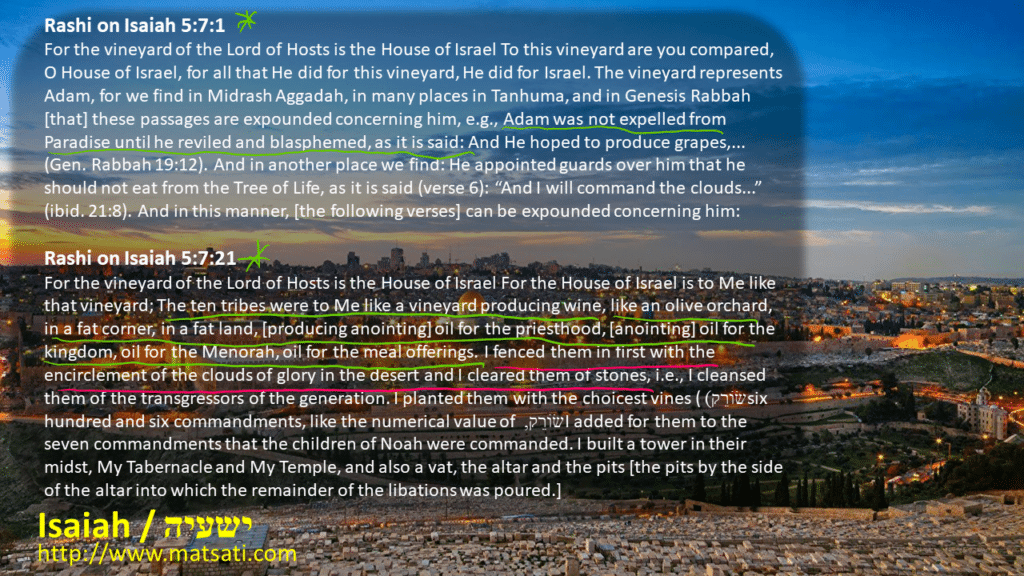
Rashi on Isaiah 5:7 Part 1
For the vineyard of the Lord of Hosts is the House of Israel To this vineyard are you compared, O House of Israel, for all that He did for this vineyard, He did for Israel. The vineyard represents Adam, for we find in Midrash Aggadah, in many places in Tanhuma, and in Genesis Rabbah [that] these passages are expounded concerning him, e.g., Adam was not expelled from Paradise until he reviled and blasphemed, as it is said: And He hoped to produce grapes,… (Gen. Rabbah 19:12). And in another place we find: He appointed guards over him that he should not eat from the Tree of Life, as it is said (verse 6): “And I will command the clouds…” (ibid. 21:8). And in this manner, [the following verses] can be expounded concerning him:
Rashi on Isaiah 5:7 Part 21
For the vineyard of the Lord of Hosts is the House of Israel For the House of Israel is to Me like that vineyard; The ten tribes were to Me like a vineyard producing wine, like an olive orchard, in a fat corner, in a fat land, [producing anointing] oil for the priesthood, [anointing] oil for the kingdom, oil for the Menorah, oil for the meal offerings. I fenced them in first with the encirclement of the clouds of glory in the desert and I cleared them of stones, i.e., I cleansed them of the transgressors of the generation. I planted them with the choicest vines (שׂוֹרֵק) six hundred and six commandments, like the numerical value of שׂוֹרֵק, I added for them to the seven commandments that the children of Noah were commanded. I built a tower in their midst, My Tabernacle and My Temple, and also a vat, the altar and the pits [the pits by the side of the altar into which the remainder of the libations was poured.]
The description of God’s people as being the vineyard, and God being the gardener is how Rashi is interpreting the words of Isaiah. Rashi draws us back to the Torah with Adam and Eve and the forbidden fruit. Their disobedience led to what Rashi says is their reviling of God and blasphemy, which is derived from Genesis Rabbah 19:12. The vineyard description we find the Lord God is tending the garden, such that He removes the stones, he takes care of the land, the trees in the garden (analogized to people) produce fruit and then oil, the Lord fences in (protects) the garden and removes the stones which inhibit growth. All of these things describe the love of God for His people, as working in their lives in their midst. Note how we are seeing this Torah centric principle in action. The question for us today is whether this Torah centric principle is in action in our lives today? Do you see the Lord God Almighty working in your life today?
Isaiah 5:8, ח יֵי דְמַקְפִין בָא עַל בָא חְקַל אוּנסָא בְחַקלָתְהֹון מְקָרְבִין אָמְרִין עַד דְנַחסֵין כָל אְתַר וּמדַמַן דְיִתְבוּן בִלחֹודֵיהֹון בְגַוַה דְאַרעָא׃ 5:8 Woe unto them that join house to house; the field of violence they bring nigh to their fields, saying, Until we possess every place; and they think they shall dwell alone in the midst of the land. ט אְמַר נְבִייָא בְאוּדְנַי הְוֵיתִי שָמַע כַד אִתגְזַרַת דָא מִן קֳדָם יוי ”צְבָאֹות“ אִם לָא בָתִין סַגִיאִין לְצָדוּ יְהֹון רַברְבִין וְטָבִין מִבְלִי יָתִיב׃ 5:9 The prophet said, With mine ears I have heard when this was decreed from before the Lord of hosts, Of a truth many houses shall be desolate, even the great and the fair, without inhabitant. י אְרֵי בְחֹובָא דְלָא יְהַבוּ מַעשְׂרַיָא בֵית עְשַר אַשכְרָאִין דִכרַם יַעבְדוּן בַתָא חְדָא וּבֵית כֹור זְרַע יַעְבֵיד תְלָת סְאִין׃ 5:10 Because of the sin of not giving tithes, the place of ten acres of vineyard shall produce one bath; and the place where a cor of seed was sown shall produce three measures. יא יֵי דְמַקדְמִין בְצַפרָא לְמִשתֵי חְמַר עַתִיק רָדְפִין מְאַחְרִין לְמִפטַר מְרַמְשִין עַד שִוָיְהֹון חְמַר אוּנסָא מַלהֵיק לְהֹון׃ 5:11 Woe unto them that rise up early in the morning, chasing after drink of old wine, delaying to separate; tarrying upon their couches till the dawn of the morning. The wine of oppression inflames them! יב וְהָוֵי עַל יְדֵי כִנָר וּנבַל קַתרֹוס וַאְבוּבָא וְחַמרָא מִשתֵיהֹון וּבאֹורָיתָא דַיוי לָא אִסתַכַלוּ וְעֹובָד גְבוּרְתֵיה לָא חְזֹו׃ 5:12 And in their feasts are the harp, and the viol, the cithara, the organ, and the wine: and the law of the Lord they regard not, neither consider the work of His power. (TgJ) TgJ has a slightly different take on the idea of joining house to house saying that the reason for this is so as not to dwell in the midst of the land alone. This idea speaks to the elimination of the tribal inheritance, note how this is a command according to Bamidbar / Numbers 36:7, וְלֹֽא־תִסֹּ֤ב נַחֲלָה֙ לִבְנֵ֣י יִשְׂרָאֵ֔ל מִמַּטֶּ֖ה אֶל־מַטֶּ֑ה כִּ֣י אִ֗ישׁ בְּנַחֲלַת֙ מַטֵּ֣ה אֲבֹתָ֔יו יִדְבְּק֖וּ בְּנֵ֥י יִשְׂרָאֵֽל׃ “So shall no inheritance of the children of Israel remove from tribe to tribe; for the children of Israel shall cleave everyone to the inheritance of the tribe of his fathers.” The Talmud states the following concerning these words.
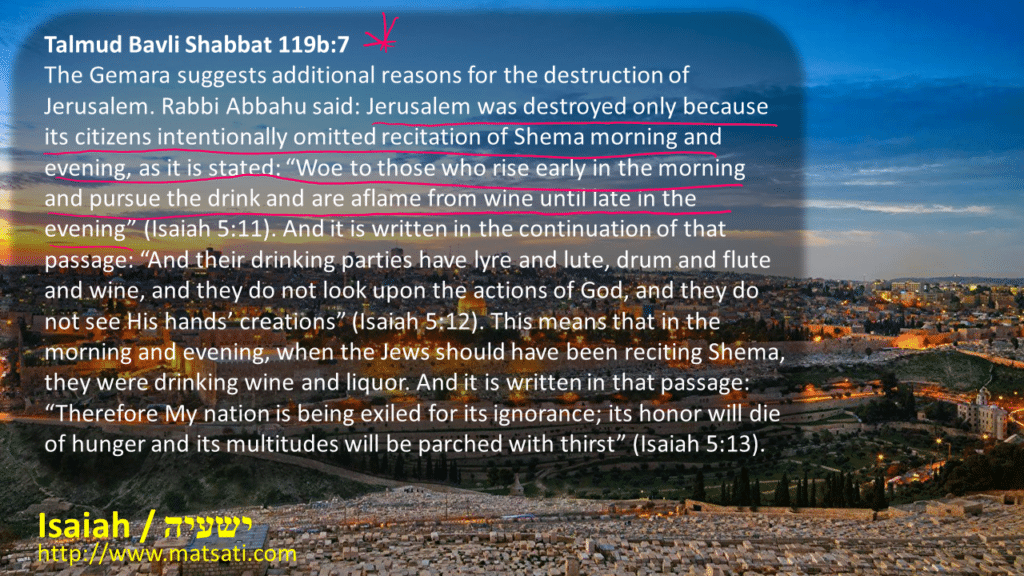
Talmud Bavli Shabbat 119b:7
The Gemara suggests additional reasons for the destruction of Jerusalem. Rabbi Abbahu said: Jerusalem was destroyed only because its citizens intentionally omitted recitation of Shema morning and evening, as it is stated: “Woe to those who rise early in the morning and pursue the drink and are aflame from wine until late in the evening” (Isaiah 5:11). And it is written in the continuation of that passage: “And their drinking parties have lyre and lute, drum and flute and wine, and they do not look upon the actions of God, and they do not see His hands’ creations” (Isaiah 5:12). This means that in the morning and evening, when the Jews should have been reciting Shema, they were drinking wine and liquor. And it is written in that passage: “Therefore My nation is being exiled for its ignorance; its honor will die of hunger and its multitudes will be parched with thirst” (Isaiah 5:13).
Note how all of these things draw in the idea that we are to trust in the Lord and how we are to make God’s Word a part of our lives, taking them seriously, and not be disingenuous towards the actions of God in our lives. The idea of becoming drunk is as dulling the senses so that one does not have to even think about honoring God according to His Word. The Talmud speaks of the Shema, as the people’s coming was due to their lack of recitation of the Shema. Let’s look at the Shema according to Devarim / Deuteronomy 6:4-7.
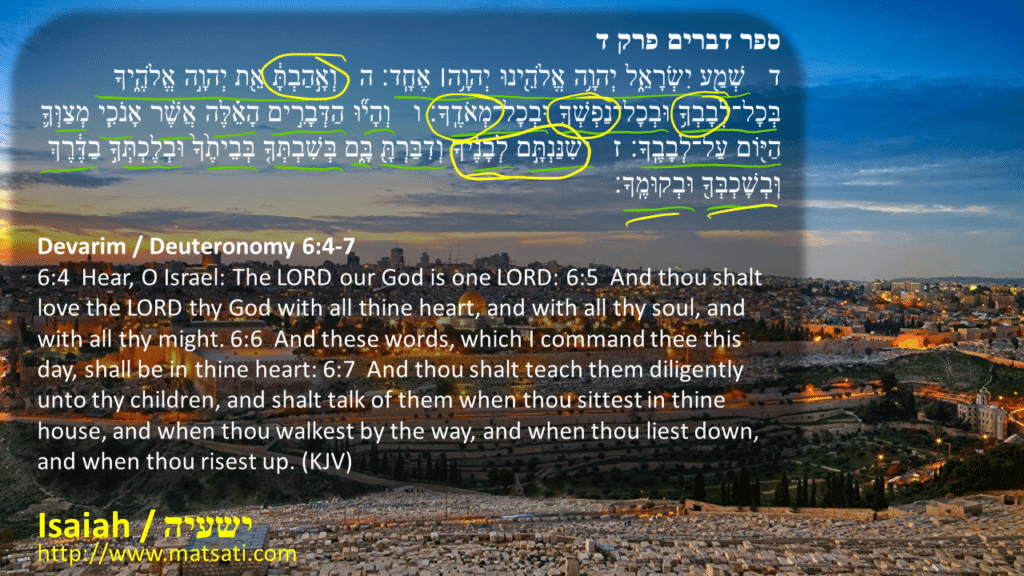
ספר דברים פרק ד
ד שְׁמַ֖ע יִשְׂרָאֵ֑ל יְהוָ֥ה אֱלֹהֵ֖ינוּ יְהוָ֥ה׀ אֶחָֽד׃ ה וְאָ֣הַבְתָּ֔ אֵ֖ת יְהוָ֣ה אֱלֹהֶ֑יךָ בְּכָל־לְבָבְךָ֥ וּבְכָל־נַפְשְׁךָ֖ וּבְכָל־מְאֹדֶֽךָ׃ ו וְהָי֞וּ הַדְּבָרִ֣ים הָאֵ֗לֶּה אֲשֶׁ֨ר אָנֹכִ֧י מְצַוְּךָ֛ הַיּ֖וֹם עַל־לְבָבֶֽךָ׃ ז וְשִׁנַּנְתָּ֣ם לְבָנֶ֔יךָ וְדִבַּרְתָּ֖ בָּ֑ם בְּשִׁבְתְּךָ֤ בְּבֵיתֶ֙ךָ֙ וּבְלֶכְתְּךָ֣ בַדֶּ֔רֶךְ וּֽבְשָׁכְבְּךָ֖ וּבְקוּמֶֽךָ׃
Devarim / Deuteronomy 6:4-7
6:4 Hear, O Israel: The LORD our God is one LORD: 6:5 And thou shalt love the LORD thy God with all thine heart, and with all thy soul, and with all thy might. 6:6 And these words, which I command thee this day, shall be in thine heart: 6:7 And thou shalt teach them diligently unto thy children, and shalt talk of them when thou sittest in thine house, and when thou walkest by the way, and when thou liest down, and when thou risest up. (KJV)
Note the significance of the Shema, the importance of loving God, of committing the heart, soul, and strength to the Lord, and of teaching our children, and of always keeping God’s commands, His holy word upon our heart throughout the day from start to finish. This is the point and source of the peoples downfall, their refusal to trust in the Lord, their turning from His holy and righteous ways. Note that Isaiah is at its core filled with messianic expectation. The book of Isaiah leads us to Him, as the Torah directs us to Messiah as well. The point of the messianic expectation is to encourage the people of God’s redemption when they’re being troubled by wicked rulers.
